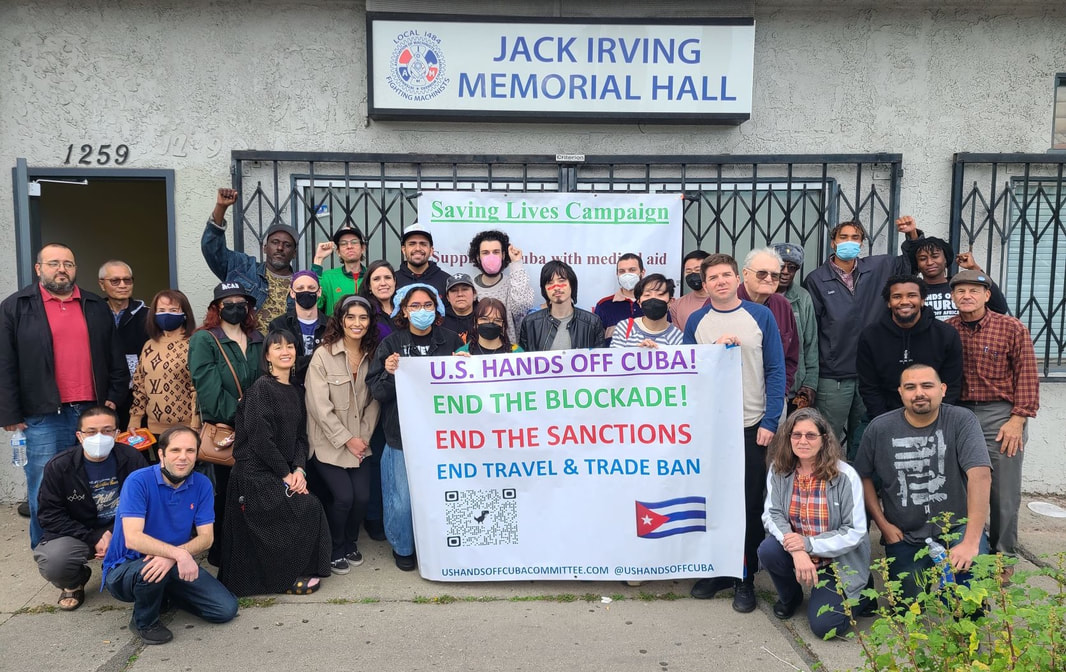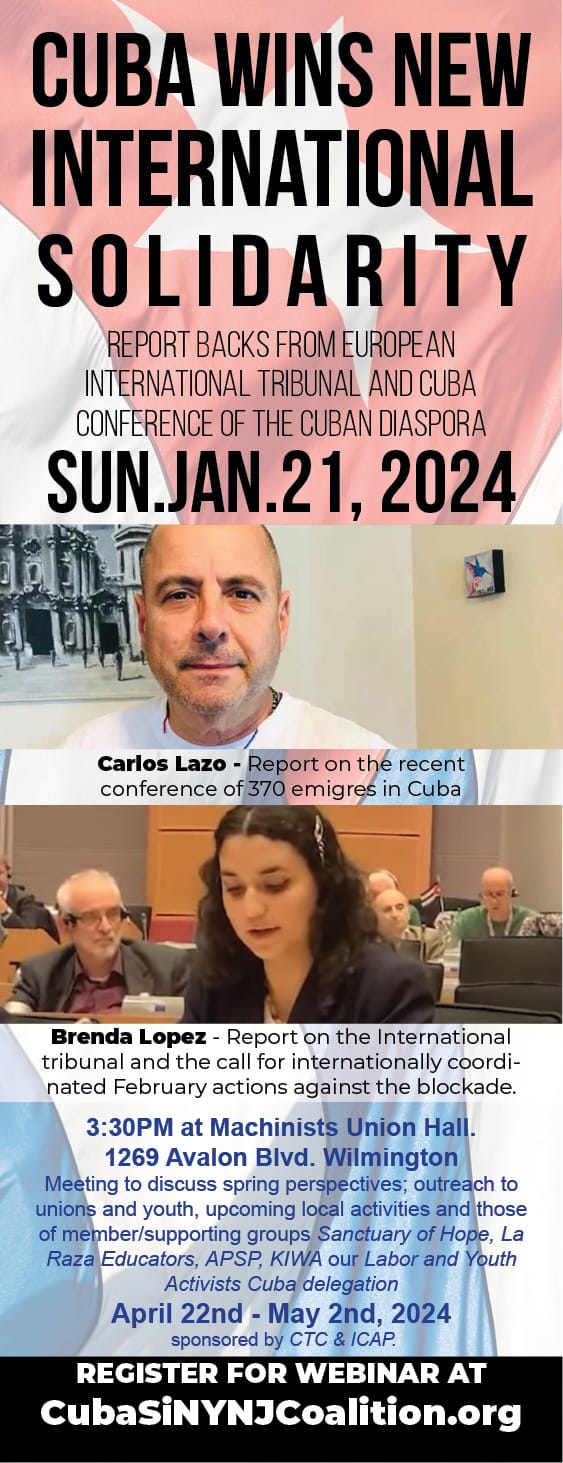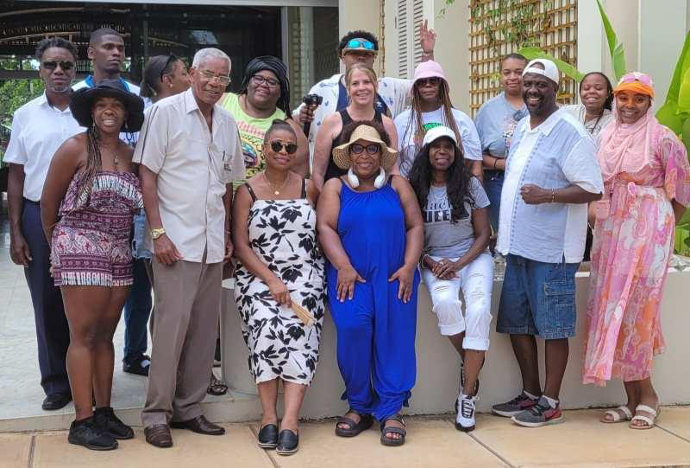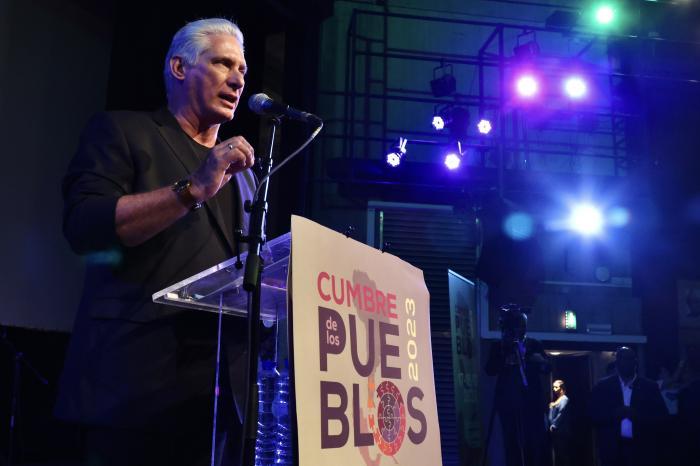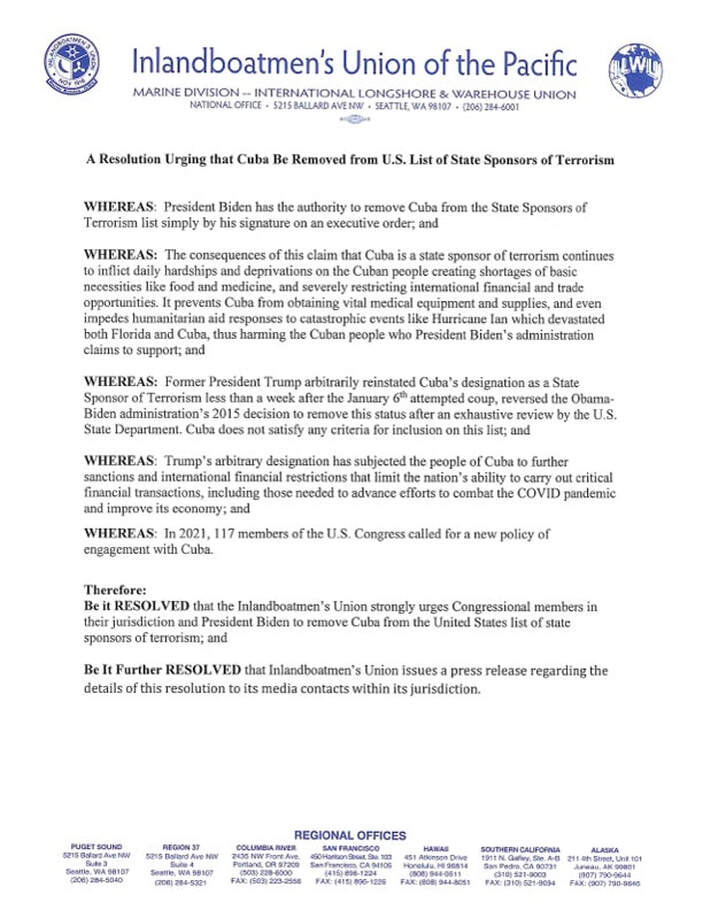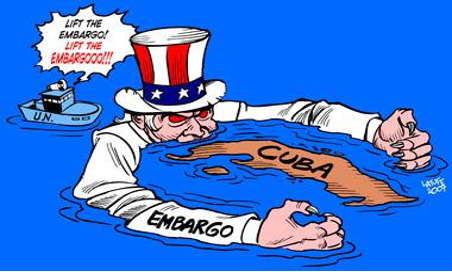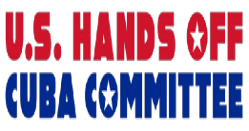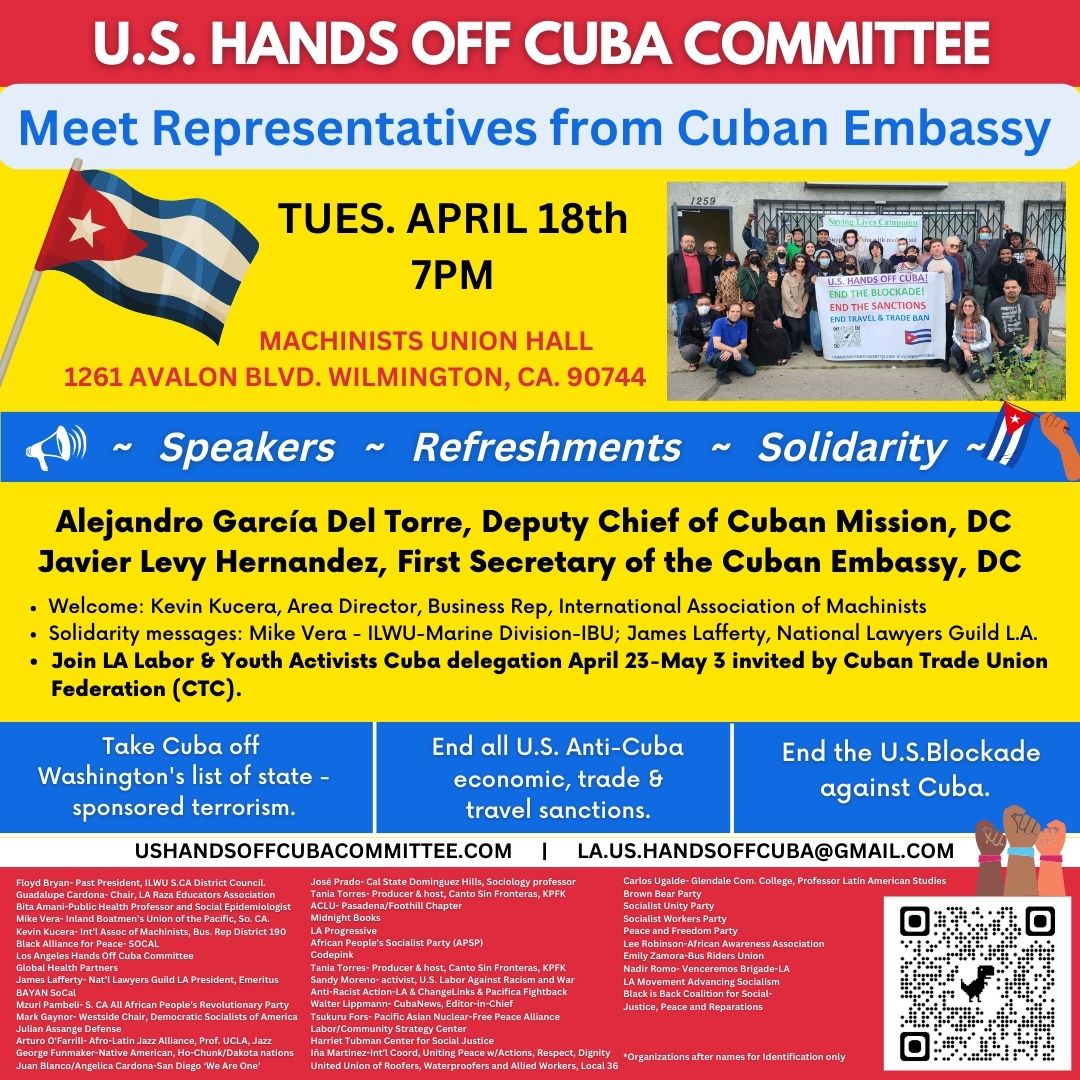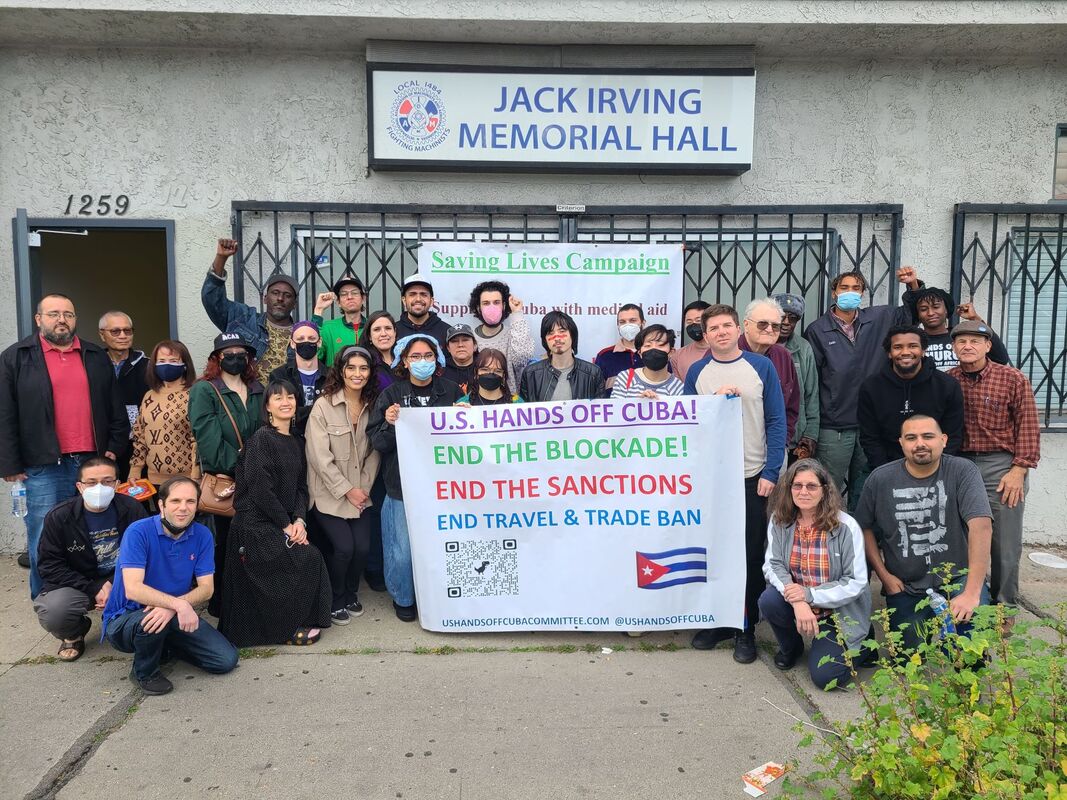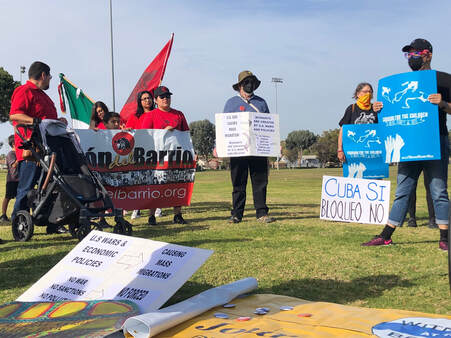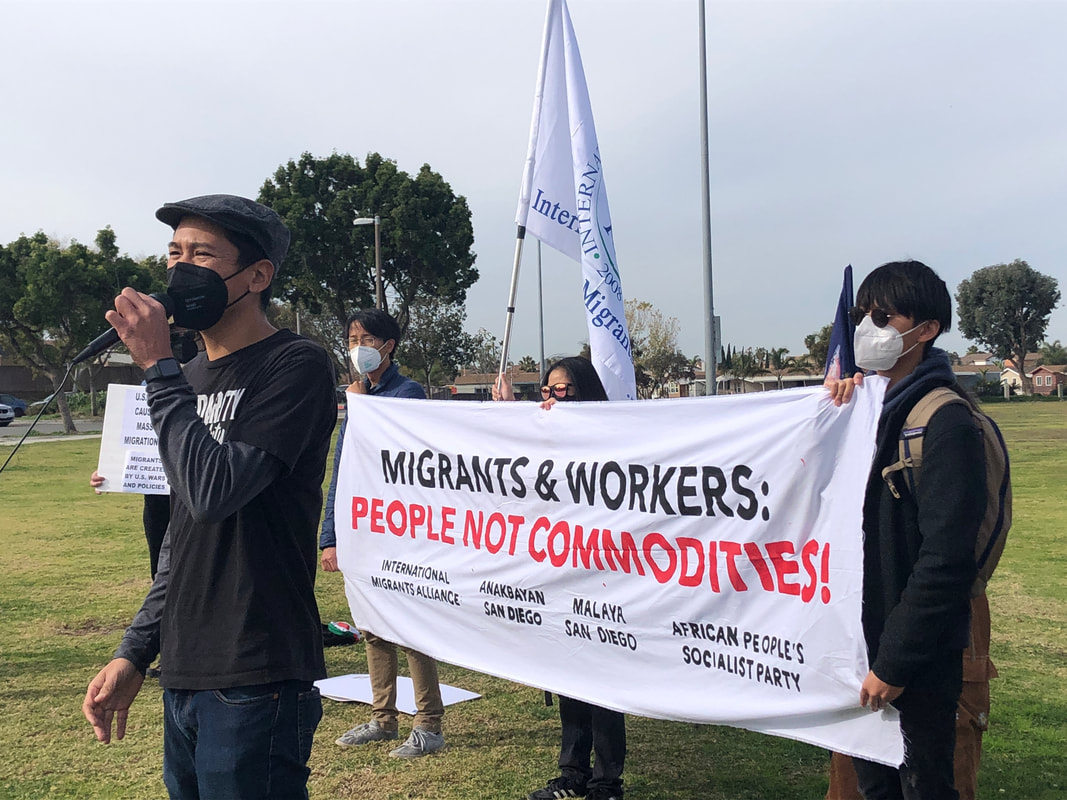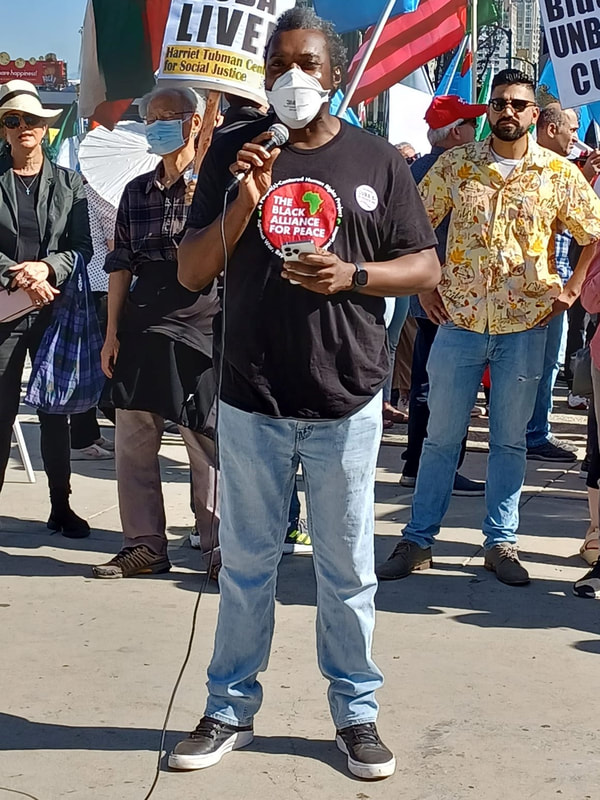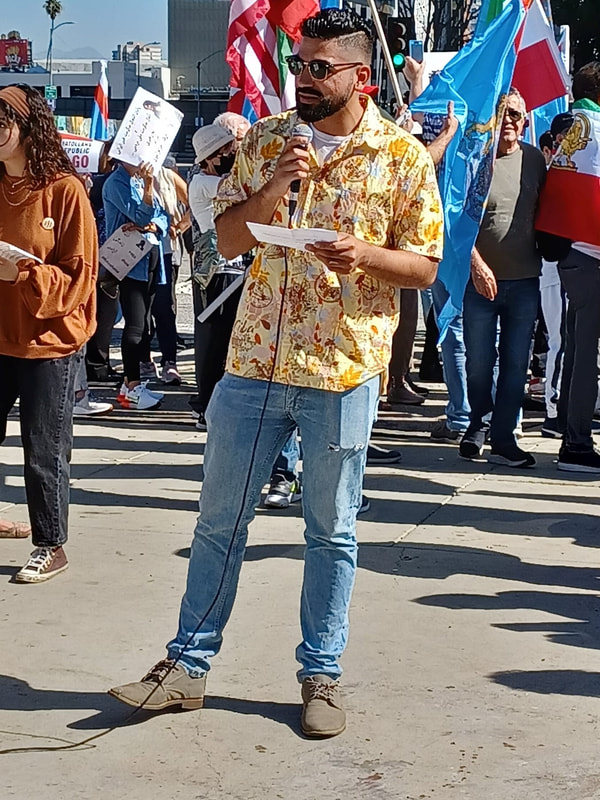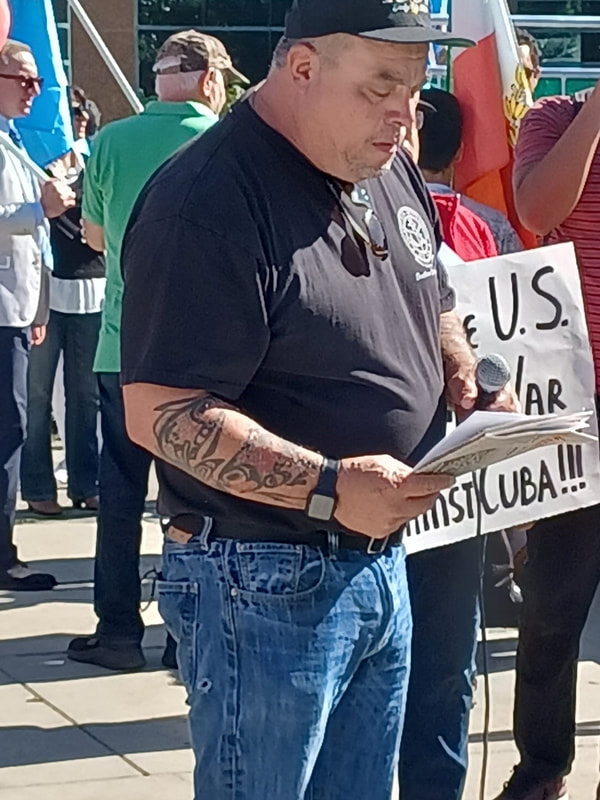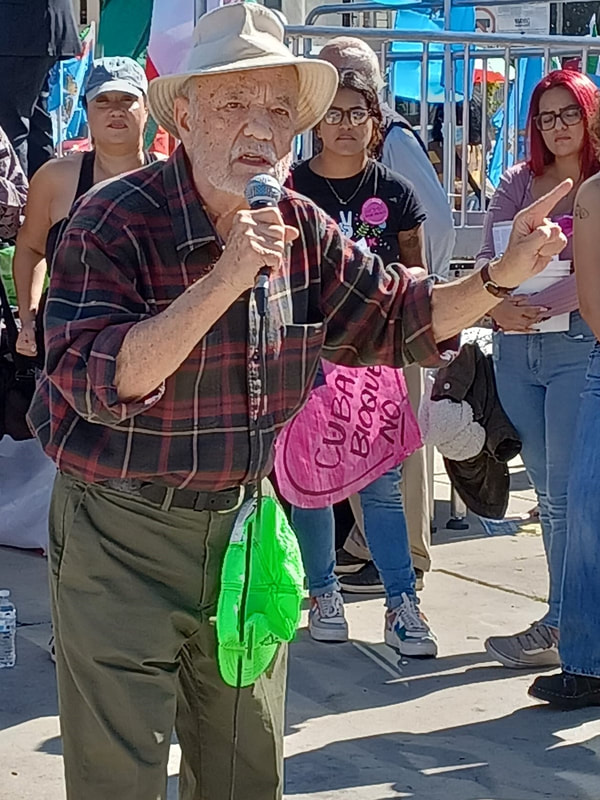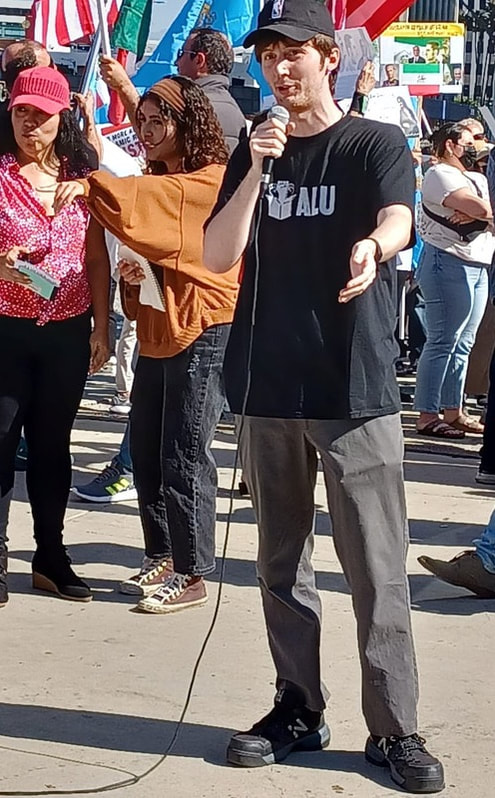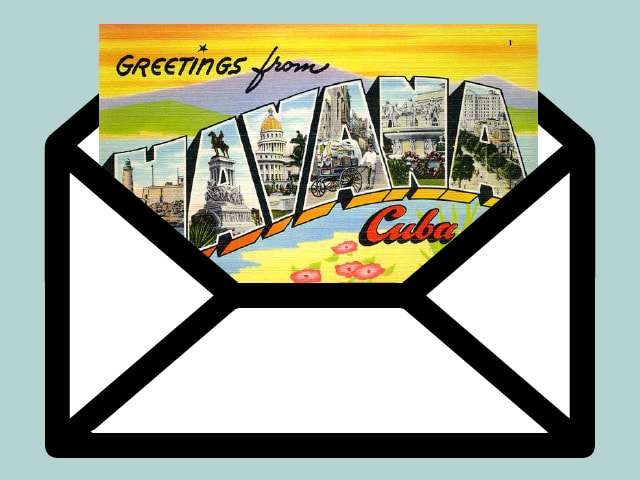HELP US KEEP THIS WEBSITE RUNNING!
SUPPORT THE WORK OF OUR COMMITTEE IN LOS ANGELES!
To donate please click above on the SUPPORT tab. THANK YOU!
SUPPORT THE WORK OF OUR COMMITTEE IN LOS ANGELES!
To donate please click above on the SUPPORT tab. THANK YOU!
Cuba 2024 labor delegation report back
Sunday, June 23 at 4 PM
Machinists Union Hall, 1261 Avalon Blvd. Wilmington
Report-back meeting will include:
• Cuban Trade Union Worker Internship (Pasantia)
• What's App live video with ELAM Palestinian student • International solidarity conference
• May Day march videos sunday June
• Federation of University Youth/Union of Young Communiststs
• Meeting with members of Poder Popular
• Cuba National Aquarium presentation
• Delegation Media coverage
• Representatives from several groups/unions including:
KPFK, ServiceEmployeesInternationalUnion,UNITE-HERE#11Amazon
Labor Union, Machinists Union #1484, Sanctuary of Hope, Democratic Socialists
of America, African People's Socialist Party, Black Men Build, Filipino activists,
Western Service Workers Union, Jobs Not Bombs, Jobs for Future...
Dinner after the program!
CALL TO ACTION:
October 29
International and national protests at US embassies & federal buildings the next time the UN votes on the U.S. Blockade of Cuba
• Cuban Trade Union Worker Internship (Pasantia)
• What's App live video with ELAM Palestinian student • International solidarity conference
• May Day march videos sunday June
• Federation of University Youth/Union of Young Communiststs
• Meeting with members of Poder Popular
• Cuba National Aquarium presentation
• Delegation Media coverage
• Representatives from several groups/unions including:
KPFK, ServiceEmployeesInternationalUnion,UNITE-HERE#11Amazon
Labor Union, Machinists Union #1484, Sanctuary of Hope, Democratic Socialists
of America, African People's Socialist Party, Black Men Build, Filipino activists,
Western Service Workers Union, Jobs Not Bombs, Jobs for Future...
Dinner after the program!
CALL TO ACTION:
October 29
International and national protests at US embassies & federal buildings the next time the UN votes on the U.S. Blockade of Cuba
https://s3-us-west-1.amazonaws.com/groupsioattachments/61254/106347742/30236/0?AWSAccessKeyId=AKIAJECNKOVMCCU3ATNQ&Expires=1718163553&Signature=7GT3OdUuJzIqf6awkQM%2Fnp5TDvU%3D&response-content-disposition=inline%3B+filename%3D%22Final%25202024%2520Labor%2520Delegation%2520Report%2520Back%2520Flyer%25201.pdf%22
Your browser does not support viewing this document. Click here to download the document.
Peace Seminar: Close U.S. Naval Base in Guantanamo!
VIII International Seminar for Peace and the Abolition of
Foreign Military Bases attended by delegates from 30 countries
Your browser does not support viewing this document. Click here to download the document.
Art and Activism in L.A. featured in Trabajadores, the newspaper of the CTC, the Confederation of Cuban Workers
Your browser does not support viewing this document. Click here to download the document.
U.S. Machinists say:
Remove Cuba from spurious SSOT list!
Your browser does not support viewing this document. Click here to download the document.
Your browser does not support viewing this document. Click here to download the document.
Spread the Truth
Trabajadores, organ of the CTC in Cuba, publicizes Cuban Ambassador's visit to LA
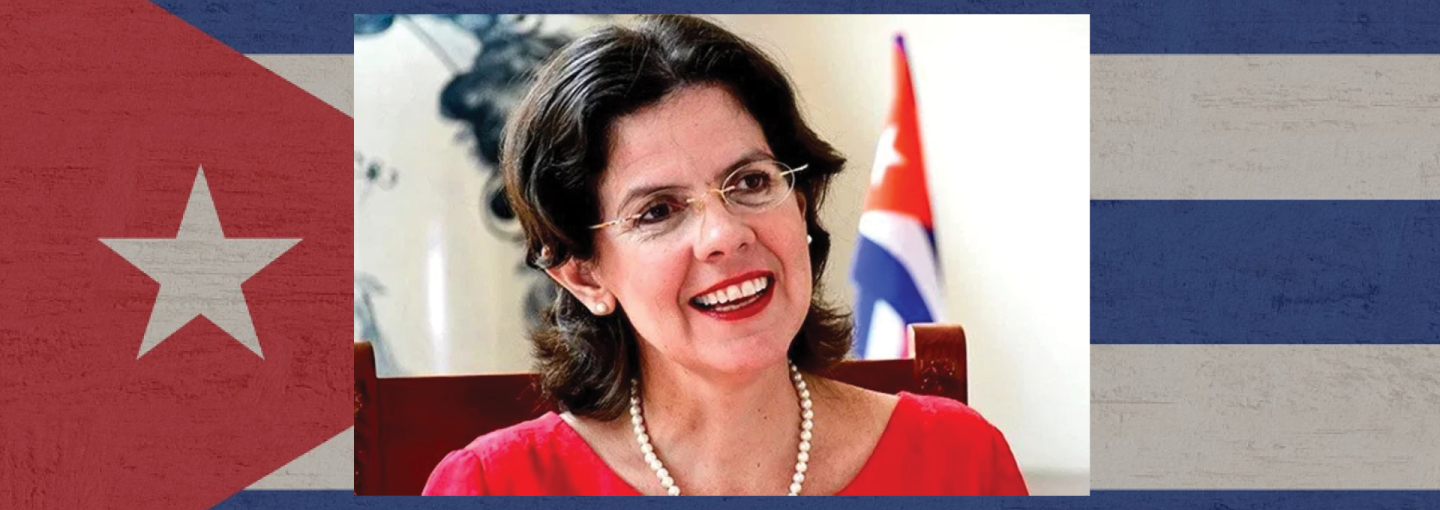
Cuban Ambassador visit to LA in Cuban workers newspaper, Trabajadores.
Use links to view original
https://groups.io/g/cubanews/topic/104981926
https://www.trabajadores.cu/20240317/difundan-la-verdad-exhorto-diplomatica-cubana/
Spread the truth,” urged a Cuban diplomat
By Yimel Díaz Malmierca (Trabajadores)
Lianys Torres Rivera, head of the Cuban Diplomatic Mission in the United States.
“The situation is tough, one of the toughest in decades. The boot of the American superpower is on our neck.
Trump and Biden put us on the list of suspects of state terrorism (SSOT), which makes things very
complicated,” said Lianys Torres Rivera, head of the Cuban diplomatic mission in the United States, in a
meeting with solidarity organizations held in the city of Los Angeles.
According to a report sent to this newsroom by Mark Friedman, coordinator of LA Hands-Off Cuba Committee,
the diplomat commented that the Cuban authorities have held conversations with their counterparts in
Washington on immigration issues, health care, and the economy, but that this dialogue has not taken place.
the impact that the sanctions against the largest of the Antilles do have.
“No bank will work with us. If we find a company willing to sell us, we must pay double or triple. European
tourists say it is too complicated to go through an interview at a U.S. embassy in Europe to enter the United
States after visiting Cuba. “Washington is targeting our income,” denounced Torres Rivera.
The Cuban representative explained that there are 20 million dollars allocated annually by the US government
for the regime change program in Cuba, the majority goes to the State of Florida, from where millions of dollars
in exports, flights and goods are also generated. , mostly by the Cuban-American community settled there;
although sanctions and the blockade prevent the rest of the United States from doing business with the
country.
The solidarity that you bring to Cuba gives us oxygen and hope, Torres assured and recognized the
importance of the support resolutions that each of these groups has approved, as well as the caravans,
meetings and protests that they have organized, including those carried out in the context of the International
Tribunal of Belgium against the United States blockade of Cuba.
The participants reported on their purpose of going to the island to participate in the International Meeting of
Solidarity with Cuba and in the May Day celebrations. They presented a delegation of fifty labor and youth
activists, made up of representatives of 8 unions, community workers and 13 organizations that have
established links of improvement and exchange with the Central Workers of Cuba, the Cuban Institute of
Friendship with the Peoples (Icap ) and other institutions.
“When you return, spread the truth, make your voice heard,” the diplomat urged.
Members and leaders of the Sanctuary of Hope, the International Society of Black Latinos, KPFK (Pacifica
Radio), IFCO/Pastors for Peace, the Hands Off Cuba Committee (LA Hands-off) participated in the meeting
with the head of the diplomatic mission. Off Cuba) and activists from the unions: American Federation of
States, Counties and Municipalities, Roofers Local 36, and the International Association of Machinists local
1484.
At the end of the meeting, the Reverend Kelvin Sauls insisted on the need to end the policy of “trauma and
terror against Cuba.” He declared that he was “disappointed” in Joe Biden's administration, as well as the lack
of resolutions from the Los Angeles authorities against the blockade and the inclusion of Cuba on the list of
State sponsors of terrorism.
Use links to view original
https://groups.io/g/cubanews/topic/104981926
https://www.trabajadores.cu/20240317/difundan-la-verdad-exhorto-diplomatica-cubana/
Spread the truth,” urged a Cuban diplomat
By Yimel Díaz Malmierca (Trabajadores)
Lianys Torres Rivera, head of the Cuban Diplomatic Mission in the United States.
“The situation is tough, one of the toughest in decades. The boot of the American superpower is on our neck.
Trump and Biden put us on the list of suspects of state terrorism (SSOT), which makes things very
complicated,” said Lianys Torres Rivera, head of the Cuban diplomatic mission in the United States, in a
meeting with solidarity organizations held in the city of Los Angeles.
According to a report sent to this newsroom by Mark Friedman, coordinator of LA Hands-Off Cuba Committee,
the diplomat commented that the Cuban authorities have held conversations with their counterparts in
Washington on immigration issues, health care, and the economy, but that this dialogue has not taken place.
the impact that the sanctions against the largest of the Antilles do have.
“No bank will work with us. If we find a company willing to sell us, we must pay double or triple. European
tourists say it is too complicated to go through an interview at a U.S. embassy in Europe to enter the United
States after visiting Cuba. “Washington is targeting our income,” denounced Torres Rivera.
The Cuban representative explained that there are 20 million dollars allocated annually by the US government
for the regime change program in Cuba, the majority goes to the State of Florida, from where millions of dollars
in exports, flights and goods are also generated. , mostly by the Cuban-American community settled there;
although sanctions and the blockade prevent the rest of the United States from doing business with the
country.
The solidarity that you bring to Cuba gives us oxygen and hope, Torres assured and recognized the
importance of the support resolutions that each of these groups has approved, as well as the caravans,
meetings and protests that they have organized, including those carried out in the context of the International
Tribunal of Belgium against the United States blockade of Cuba.
The participants reported on their purpose of going to the island to participate in the International Meeting of
Solidarity with Cuba and in the May Day celebrations. They presented a delegation of fifty labor and youth
activists, made up of representatives of 8 unions, community workers and 13 organizations that have
established links of improvement and exchange with the Central Workers of Cuba, the Cuban Institute of
Friendship with the Peoples (Icap ) and other institutions.
“When you return, spread the truth, make your voice heard,” the diplomat urged.
Members and leaders of the Sanctuary of Hope, the International Society of Black Latinos, KPFK (Pacifica
Radio), IFCO/Pastors for Peace, the Hands Off Cuba Committee (LA Hands-off) participated in the meeting
with the head of the diplomatic mission. Off Cuba) and activists from the unions: American Federation of
States, Counties and Municipalities, Roofers Local 36, and the International Association of Machinists local
1484.
At the end of the meeting, the Reverend Kelvin Sauls insisted on the need to end the policy of “trauma and
terror against Cuba.” He declared that he was “disappointed” in Joe Biden's administration, as well as the lack
of resolutions from the Los Angeles authorities against the blockade and the inclusion of Cuba on the list of
State sponsors of terrorism.
What are they hiding from us?
From Granma, official newspaper of the Cuban Communist Party, reporting on the International tribunal against the US blockade of Cuba, Brussels Nov. 16-17.
"What are they hiding from us?", the question of an American to her Government
In an interview with Granma through WhatsApp, she indicated her intention to demonstrate with examples how Cuba is harmed by sanctions from the US.
Author: Nuria Barbosa León | [email protected]
November 14, 2023
The American social activist Brenda López is among the witnesses appearing before the International Tribunal against the blockade, which meets today and tomorrow in the European Parliament, based in Brussels, Belgium.
In an interview with Granma, through WhatsApp, she indicated her intention to demonstrate with examples how Cuba is harmed by the sanctions from the US, intensified by the administration of former President Donald Trump, who before leaving the White House included the Caribbean island in a list that accuses it of being a country that allegedly sponsors terrorism.
The founder of the Hands Off Cuba Committee in Los Angeles, California and Cleveland, Ohio, will denounce how the blockade prevents a bond between students because their Insurance does not cover trips to Cuba to carry out internships or other types of courses.
In turn, it hinders union exchanges between workers, who cannot hold bilateral events, and solidarity in cooperation actions between union members from both countries is blocked.
She specified that Cuba has a long experience in the training of doctors, and if the blockade did not exist, there would be many more young people from her country who could study at the Latin American School of Medicine.
She added that the blockade created enormous obstacles to collaboration between biotech industries and scientists.
"American scientific journals rarely publish the work of Cuban researchers," she stated, and if they do, payment for the material or virtual exchange through digital platforms is impossible.
She stated that American farmers would like to sell their products to Cuba. "In Cleveland, where I currently live, the City Council passed a resolution calling for an end to the blockade, expressly citing special concern because Ohio farmers and manufacturers have products to sell, and Cuba wants to buy," she noted.
In addition, the Life Task, "Tarea Vida" is known to solve environmental problems in the Greater Antilles, an experience that could be useful in the United States, but is not disseminated, because it is a punished country.
"When our Government prevents us from connecting with others, and building a better future together, the question really arises: what are they hiding from us?" concluded the activist.
To see the source click on link below:
https://www.granma.cu/mundo/2023-11-14/que-nos-ocultan-pregunta-brenda-lopez-al-gobierno-de-ee-uu
"What are they hiding from us?", the question of an American to her Government
In an interview with Granma through WhatsApp, she indicated her intention to demonstrate with examples how Cuba is harmed by sanctions from the US.
Author: Nuria Barbosa León | [email protected]
November 14, 2023
The American social activist Brenda López is among the witnesses appearing before the International Tribunal against the blockade, which meets today and tomorrow in the European Parliament, based in Brussels, Belgium.
In an interview with Granma, through WhatsApp, she indicated her intention to demonstrate with examples how Cuba is harmed by the sanctions from the US, intensified by the administration of former President Donald Trump, who before leaving the White House included the Caribbean island in a list that accuses it of being a country that allegedly sponsors terrorism.
The founder of the Hands Off Cuba Committee in Los Angeles, California and Cleveland, Ohio, will denounce how the blockade prevents a bond between students because their Insurance does not cover trips to Cuba to carry out internships or other types of courses.
In turn, it hinders union exchanges between workers, who cannot hold bilateral events, and solidarity in cooperation actions between union members from both countries is blocked.
She specified that Cuba has a long experience in the training of doctors, and if the blockade did not exist, there would be many more young people from her country who could study at the Latin American School of Medicine.
She added that the blockade created enormous obstacles to collaboration between biotech industries and scientists.
"American scientific journals rarely publish the work of Cuban researchers," she stated, and if they do, payment for the material or virtual exchange through digital platforms is impossible.
She stated that American farmers would like to sell their products to Cuba. "In Cleveland, where I currently live, the City Council passed a resolution calling for an end to the blockade, expressly citing special concern because Ohio farmers and manufacturers have products to sell, and Cuba wants to buy," she noted.
In addition, the Life Task, "Tarea Vida" is known to solve environmental problems in the Greater Antilles, an experience that could be useful in the United States, but is not disseminated, because it is a punished country.
"When our Government prevents us from connecting with others, and building a better future together, the question really arises: what are they hiding from us?" concluded the activist.
To see the source click on link below:
https://www.granma.cu/mundo/2023-11-14/que-nos-ocultan-pregunta-brenda-lopez-al-gobierno-de-ee-uu
Brussels Declaration
November 17, 2023
Solidarity with Cuba Against the Blockade
The movement of solidarity with Cuba in Europe and the United States, represented by 263 delegates from 21 countries, after hearing the verdict of the International Tribunal against the Blockade, which met on November 16 and 17 in the European Parliament, in Brussels, whose judges have issued a sentence condemning the United States government for crimes of aggression and crimes against humanity, which could lead to the genocide of the Cuban people, and who also have the obligation to end the economic, commercial and financial blockade against Cuba, as well as compensating the victims, we reaffirm our commitment to the fight against this criminal Blockade, as well as demand the exclusion of Cuba from the list of countries sponsoring terrorism prepared by the United States.
For all this, solidarity with Cuba will plan global and coordinated actions with different associations around the world, to convey the legal content of the aforementioned ruling to all institutions and agents of civil society, in order to increase international pressure and finally force the United States government to put an end to this enormous violation of human rights.
[Signatories]
Those present here.
Brussels, November 17, 2023
For all this, solidarity with Cuba will plan global and coordinated actions with different associations around the world, to convey the legal content of the aforementioned ruling to all institutions and agents of civil society, in order to increase international pressure and finally force the United States government to put an end to this enormous violation of human rights.
[Signatories]
Those present here.
Brussels, November 17, 2023
International Tribunal Denounces
the U.S. Blockade of Cuba
By Brenda Lopez and Mark Friedman - A report by participants
Brussels, Belgium--November 16-17 marked a prominent meeting at the European Parliament of 263 anti-blockade activists, government figures, lawyers, prosecutors, scientists, doctors, artists and others from 21 countries.
Following opening remarks and announcing categories of judges, prosecutors and witnesses, Cuban lawyer Yamila Gonzalez Ferrer reviewed 30 US government acts and executive orders against Cuba. Trading with the Enemies act, Torricelli Act and, the Helms-Burton Act, the most mentioned since it extends U.S. legislation to punish foreign companies investing simultaneously in the United States and Cuba.
“This is not a bilateral affair; sanctions are applied against US and European businesses. Applied in an extra territorial manner, impacting 3rd country businesses and sovereignty. No blockade has ever been as brutal as against Cuba” Gonzalez Ferrer pointed out. Adding that this is a “crime of genocide, economic war where two sets of laws are being violated: 1) UN charter, Principles of International Law and 2) Universal Declaration of Civil and Human Rights. These sanctions are in violation of international law. This violates the rights of Cuban and citizens of the U.S. A web of laws that make up the blockade, an affront to our sovereignty and self-
determination.”
Other speakers pointed out that the Electronic System for Travel Authorization (ESTA) program {an automated system that determines the eligibility of visitors to travel to the United States under the Visa Waiver Program } punishes Europeans for traveling to Cuba because they will be singled out, often intimidated and denied, as the case with Professor Helen Yaffe producer of Tarea Vida, when applying for a U.S. visa. This has a negative impact on Cuban tourism as a source of euros for purchases on the world market. Horrific fines are levied against European banks for loaning Cuba money to purchase necessary products.
Renowned jurists evaluated presentations by the victims, among them, Cuban mothers with children who are sick with cancer and who cannot access new treatments and medicines, due to the cruel sanctions that have punished Cuba for more than six decades.
The prominent scientist Belinda Sánchez was involved in the development of the Covid vaccine. A hard task since Cuban scientists are heavily impacted by the sanctions which greatly limit their access to vital materials to be able to do their research and work. Sanchez mentioned, “I have worked for 30 years in the Molecular Innovation Center. Part of the Bio-Cuba Pharma company. The blockade has affected us for decades… We must contract the reagents and assets necessary for research from third parties, increasing their price, often by 20 percent, which means the expenditure of over one million annually, above what it would have cost, if acquired directly.”
She also said that the acquisition of technologies with components that exceed 10% of parts originating in the U.S. or its subsidiaries is prohibited, payment to scientific publications cannot be charged by their authors, and visas are denied to scientists from the island to participate in events in U.S. territory. (La Prensa)
Likewise, U.S. patients are denied the possibility of receiving treatment in Cuba, because they do not fall into the 12 categories authorized by the State Department. “We have to go through a middleman to purchase inputs for research and production, such as ingredients—with a 20%
price increase. Research is stifled. We cannot use Zoom or Teams to communicate with others internationally, we wait longer for products to get to hospitals. We could save millions of dollars if able to purchase directly from the US. Cuba faces an inability to pay for patents, so our medicines are copied by others, 24 in cancer research alone. There is an increased
perceived risk of U.S. businesses working with us thus impacting clinical development of our lung cancer and diabetes treatments. Medicines are not getting to those who need them.” Ms. Sanchez added that U.S. patients are unable to travel to Cuba, and researchers are unable to travel to the U.S. to participate in scientific conferences. Leaving U.S. doctors and scientists with the inability to collaborate. Despite all these obstacles doctors have vaccinated virtually the entire population.Later in the tribunal many organizations added to the evidence for the judges to consider. The president of Cuba-France Coopération, Víctor Fernández, stated that the extraterritorial impact of Washington's hostile policy hinders the execution of projects in France and Spain, to assist in the socioeconomic development of the island. He also attested to how banks refuse to make transfers to the Caribbean country, even in cases of humanitarian aid in the face of hurricanes.
Through a video message, the former Chancellor of Denmark and president, during 2015 and 2016, of the UN General Assembly, Mogens Lykketoft, pointed out the extraterritoriality of the siege and the consequences of this policy for the socio-economic development of the Caribbean country. Businessmen Juan Francisco (Spain) and Michele Curto (Italy) also denounced the impact of the blockade on European businesses. Other witnesses explained the difficulties they encounter in their humanitarian work, often limited in the pediatric field, due to the regulations derived from the blockade, which prevent the sale of drugs and medical supplies destined for the Greater Antilles.
Guadalupe Aguilar, representing Puentes de Amor led by Cuban-American Carlos Lazo, told the crowd “We represent the movement of Cuban and non-Cubans from around the world, off all different political views. We organize caravans, events around the world to bring powdered milk to Cuba, special medicines for liver surgery. The blockade is killing people. We tried to obtain catheters for Cuban children; the sanctioned company, would not sell to Cuba. Finally, we had to purchase thousands of these tubes from Mexico. Thus, impacting children. Puentes de Amor denounces the genocide against Cubans.”
Brenda Lopez, representing the Los Angeles & Cleveland Hands Off Cuba Committees, and the youngest witness to testify, described the impact of the blockade on U.S. youth. She listed more than six areas of interest to U.S. and Cuban youth that were restricted.
“In the US we are fooled to believe that we have equal access to opportunity and the ability to connect and exchange ideas with the whole world, but the reality is quite different. Here are some specific examples of what US youth lose because of the 243 sanctions and terrorism listing the U.S. has against Cuba:
First, the U.S. blockade of Cuba prevents a vital exchange of ideas and experiences between young American students and youth in Cuban educational institutions.
Second, over a quarter of US agricultural workers are overwhelmingly young immigrants, often undocumented, that work in super-exploitative health-endangering agriculture.
Third, In the U.S. fewer than 6% of medical graduates are Black/brown. Young people who dream of being doctors in the U.S. will owe a median average of $215,100 or more in educational debt.
Fourth, the blockade has also created gigantic obstacles towards collaboration between Cuba’s world-class bio-technical industries and scientists in the U.S., many of whom are young.
Fifth, U.S. farmers would like to sell more agricultural goods to Cuba, but cannot due to the blockade.
Sixth, U.S. youth are clearly interested in the state of our environment, as seen in the demonstrations where tens of thousands have come out to express their anxieties and fears about the lack of action by those in charge to address our climate crisis. Unlike Cuba, who addresses current environmental issues through their environmental plan Tarea Vida.
In conclusion, young people in the U.S. are looking for alternatives and solutions in a system that continuously shows it does not have our best interest in mind. When our governments stop us from connecting with others and building better futures together, we really have to question what it is they are actually trying to hide from us.”
The main judge, Norman Peach, commented that her testimony was refreshing since it was the only one that focused on how it affects people in the U.S., specifically the youth.
Franco Cavalier of MediCuba, a cancer center in Switzerland explained how they “were created to help supply materiel for Cuban health care system after the collapse of the Soviet Union. We now exist in 14 European countries.”
Commented [MF1]: Insert his nameMichel Lambert, former member of the French parliament, attacked the “extraterritorial impact of U.S. laws such as the Helms-Burton act for EU businesses or individuals. We need a shield against the sword of the U.S.” Multiple members of
the EU and French parliament spoke as did the Rosa Luxembourg Center in Mexico.
After two days of hearings, a judgment by the half-dozen judges included the following:
“The dramatic and huge impact of the above-mentioned laws and regulations, maintained for more than 60 years; also demonstrates that no blockade has been as comprehensive, long-lasting and brutal against a people as the one that the United States have maintained against Cuba. The blockade has resulted directly and indirectly in the loss of numerous human lives and the decision of the US to maintain this blockade until the Cuban people decide not to bow to the US are determined to maintain measures that are calculated to bring about in the long term the
physical destruction at least in part of the Cuban people. Such an attitude could amount to a crime of genocide.”
In an interview with Resumen Latinoamericano, German tribunal Judge Norman Peach stated:
“We are hopeful that European governments will make a valid influence on the U.S. government. We appeal to the reason not only political, but also legal, of a government that must comply with the basis of the UN Charter to ‘live and coexist in peace with neighboring states. And although the court’s ruling will not be legally binding, it will serve as a theoretical and legal argumentation and also as working material for solidarity associations, political parties, trade union organizations, companies and countries.”
Fernando Gonzalez Llort closed a meeting with country representatives, held after the tribunal, at which time a resolution calling for internationally coordinated actions, led by European nations, would take place against the blockade. Each country was also motivated in the discussion to develop their own unique plan of action to put pressures on their governments to
pressure the U.S. to get Cuba removed from Washington’s list of alleged terrorist nations and put an end to the inhumane blockade.
Link to Conference summary: https://youtu.be/2MrcY77i2FY?si=g6NrzpdpsWqV37ZP
Link to Tribunal Press Conference: https://www.youtube.com/watch?v=2MrcY77i2FY
Brussels, Belgium--November 16-17 marked a prominent meeting at the European Parliament of 263 anti-blockade activists, government figures, lawyers, prosecutors, scientists, doctors, artists and others from 21 countries.
Following opening remarks and announcing categories of judges, prosecutors and witnesses, Cuban lawyer Yamila Gonzalez Ferrer reviewed 30 US government acts and executive orders against Cuba. Trading with the Enemies act, Torricelli Act and, the Helms-Burton Act, the most mentioned since it extends U.S. legislation to punish foreign companies investing simultaneously in the United States and Cuba.
“This is not a bilateral affair; sanctions are applied against US and European businesses. Applied in an extra territorial manner, impacting 3rd country businesses and sovereignty. No blockade has ever been as brutal as against Cuba” Gonzalez Ferrer pointed out. Adding that this is a “crime of genocide, economic war where two sets of laws are being violated: 1) UN charter, Principles of International Law and 2) Universal Declaration of Civil and Human Rights. These sanctions are in violation of international law. This violates the rights of Cuban and citizens of the U.S. A web of laws that make up the blockade, an affront to our sovereignty and self-
determination.”
Other speakers pointed out that the Electronic System for Travel Authorization (ESTA) program {an automated system that determines the eligibility of visitors to travel to the United States under the Visa Waiver Program } punishes Europeans for traveling to Cuba because they will be singled out, often intimidated and denied, as the case with Professor Helen Yaffe producer of Tarea Vida, when applying for a U.S. visa. This has a negative impact on Cuban tourism as a source of euros for purchases on the world market. Horrific fines are levied against European banks for loaning Cuba money to purchase necessary products.
Renowned jurists evaluated presentations by the victims, among them, Cuban mothers with children who are sick with cancer and who cannot access new treatments and medicines, due to the cruel sanctions that have punished Cuba for more than six decades.
The prominent scientist Belinda Sánchez was involved in the development of the Covid vaccine. A hard task since Cuban scientists are heavily impacted by the sanctions which greatly limit their access to vital materials to be able to do their research and work. Sanchez mentioned, “I have worked for 30 years in the Molecular Innovation Center. Part of the Bio-Cuba Pharma company. The blockade has affected us for decades… We must contract the reagents and assets necessary for research from third parties, increasing their price, often by 20 percent, which means the expenditure of over one million annually, above what it would have cost, if acquired directly.”
She also said that the acquisition of technologies with components that exceed 10% of parts originating in the U.S. or its subsidiaries is prohibited, payment to scientific publications cannot be charged by their authors, and visas are denied to scientists from the island to participate in events in U.S. territory. (La Prensa)
Likewise, U.S. patients are denied the possibility of receiving treatment in Cuba, because they do not fall into the 12 categories authorized by the State Department. “We have to go through a middleman to purchase inputs for research and production, such as ingredients—with a 20%
price increase. Research is stifled. We cannot use Zoom or Teams to communicate with others internationally, we wait longer for products to get to hospitals. We could save millions of dollars if able to purchase directly from the US. Cuba faces an inability to pay for patents, so our medicines are copied by others, 24 in cancer research alone. There is an increased
perceived risk of U.S. businesses working with us thus impacting clinical development of our lung cancer and diabetes treatments. Medicines are not getting to those who need them.” Ms. Sanchez added that U.S. patients are unable to travel to Cuba, and researchers are unable to travel to the U.S. to participate in scientific conferences. Leaving U.S. doctors and scientists with the inability to collaborate. Despite all these obstacles doctors have vaccinated virtually the entire population.Later in the tribunal many organizations added to the evidence for the judges to consider. The president of Cuba-France Coopération, Víctor Fernández, stated that the extraterritorial impact of Washington's hostile policy hinders the execution of projects in France and Spain, to assist in the socioeconomic development of the island. He also attested to how banks refuse to make transfers to the Caribbean country, even in cases of humanitarian aid in the face of hurricanes.
Through a video message, the former Chancellor of Denmark and president, during 2015 and 2016, of the UN General Assembly, Mogens Lykketoft, pointed out the extraterritoriality of the siege and the consequences of this policy for the socio-economic development of the Caribbean country. Businessmen Juan Francisco (Spain) and Michele Curto (Italy) also denounced the impact of the blockade on European businesses. Other witnesses explained the difficulties they encounter in their humanitarian work, often limited in the pediatric field, due to the regulations derived from the blockade, which prevent the sale of drugs and medical supplies destined for the Greater Antilles.
Guadalupe Aguilar, representing Puentes de Amor led by Cuban-American Carlos Lazo, told the crowd “We represent the movement of Cuban and non-Cubans from around the world, off all different political views. We organize caravans, events around the world to bring powdered milk to Cuba, special medicines for liver surgery. The blockade is killing people. We tried to obtain catheters for Cuban children; the sanctioned company, would not sell to Cuba. Finally, we had to purchase thousands of these tubes from Mexico. Thus, impacting children. Puentes de Amor denounces the genocide against Cubans.”
Brenda Lopez, representing the Los Angeles & Cleveland Hands Off Cuba Committees, and the youngest witness to testify, described the impact of the blockade on U.S. youth. She listed more than six areas of interest to U.S. and Cuban youth that were restricted.
“In the US we are fooled to believe that we have equal access to opportunity and the ability to connect and exchange ideas with the whole world, but the reality is quite different. Here are some specific examples of what US youth lose because of the 243 sanctions and terrorism listing the U.S. has against Cuba:
First, the U.S. blockade of Cuba prevents a vital exchange of ideas and experiences between young American students and youth in Cuban educational institutions.
Second, over a quarter of US agricultural workers are overwhelmingly young immigrants, often undocumented, that work in super-exploitative health-endangering agriculture.
Third, In the U.S. fewer than 6% of medical graduates are Black/brown. Young people who dream of being doctors in the U.S. will owe a median average of $215,100 or more in educational debt.
Fourth, the blockade has also created gigantic obstacles towards collaboration between Cuba’s world-class bio-technical industries and scientists in the U.S., many of whom are young.
Fifth, U.S. farmers would like to sell more agricultural goods to Cuba, but cannot due to the blockade.
Sixth, U.S. youth are clearly interested in the state of our environment, as seen in the demonstrations where tens of thousands have come out to express their anxieties and fears about the lack of action by those in charge to address our climate crisis. Unlike Cuba, who addresses current environmental issues through their environmental plan Tarea Vida.
In conclusion, young people in the U.S. are looking for alternatives and solutions in a system that continuously shows it does not have our best interest in mind. When our governments stop us from connecting with others and building better futures together, we really have to question what it is they are actually trying to hide from us.”
The main judge, Norman Peach, commented that her testimony was refreshing since it was the only one that focused on how it affects people in the U.S., specifically the youth.
Franco Cavalier of MediCuba, a cancer center in Switzerland explained how they “were created to help supply materiel for Cuban health care system after the collapse of the Soviet Union. We now exist in 14 European countries.”
Commented [MF1]: Insert his nameMichel Lambert, former member of the French parliament, attacked the “extraterritorial impact of U.S. laws such as the Helms-Burton act for EU businesses or individuals. We need a shield against the sword of the U.S.” Multiple members of
the EU and French parliament spoke as did the Rosa Luxembourg Center in Mexico.
After two days of hearings, a judgment by the half-dozen judges included the following:
“The dramatic and huge impact of the above-mentioned laws and regulations, maintained for more than 60 years; also demonstrates that no blockade has been as comprehensive, long-lasting and brutal against a people as the one that the United States have maintained against Cuba. The blockade has resulted directly and indirectly in the loss of numerous human lives and the decision of the US to maintain this blockade until the Cuban people decide not to bow to the US are determined to maintain measures that are calculated to bring about in the long term the
physical destruction at least in part of the Cuban people. Such an attitude could amount to a crime of genocide.”
In an interview with Resumen Latinoamericano, German tribunal Judge Norman Peach stated:
“We are hopeful that European governments will make a valid influence on the U.S. government. We appeal to the reason not only political, but also legal, of a government that must comply with the basis of the UN Charter to ‘live and coexist in peace with neighboring states. And although the court’s ruling will not be legally binding, it will serve as a theoretical and legal argumentation and also as working material for solidarity associations, political parties, trade union organizations, companies and countries.”
Fernando Gonzalez Llort closed a meeting with country representatives, held after the tribunal, at which time a resolution calling for internationally coordinated actions, led by European nations, would take place against the blockade. Each country was also motivated in the discussion to develop their own unique plan of action to put pressures on their governments to
pressure the U.S. to get Cuba removed from Washington’s list of alleged terrorist nations and put an end to the inhumane blockade.
Link to Conference summary: https://youtu.be/2MrcY77i2FY?si=g6NrzpdpsWqV37ZP
Link to Tribunal Press Conference: https://www.youtube.com/watch?v=2MrcY77i2FY
Trabajadores, the official organ of the Cuban Trade Union Federation (CTC), welcomes resolution by the Los Angeles County Federation of Labor
against the U.S. blockade of Cuba
Your browser does not support viewing this document. Click here to download the document.
WELCOME THE SANCTUARY OF HOPE DELEGATION BACK FROM CUBA
Sanctuary of Hope is a youth development organization based in south Los Angeles. It is rooted in social justice and equity, regional and global intersectionality, and committed to resource system-impacted young people throughout Los Angeles County to thrive.
Sanctuary of Hope hosted a 7-day immersive leadership development, educational, cultural and humanitarian encounter in solidarity and support of the Cuban people to Havana, Cuba with 14 young adults, staff and Board members.
Sanctuary of Hope hosted a 7-day immersive leadership development, educational, cultural and humanitarian encounter in solidarity and support of the Cuban people to Havana, Cuba with 14 young adults, staff and Board members.
Come to an informal get together where they will share
their experiences and what they learned
SUNDAY, AUGUST 27, 2PM @ MACHINISTS UNION HALL
1261 Avalon Blvd. Wilmington, CA 90744.
This informal get together will be followed by:
Medical Aid for Cuba Fundraising Concert
Featuring Havana Jazz Festival headliner Dayramir Gonzalez & OMOACHE (San Diego Afro-Cuban dance troupe), Derick Benoit, Michael Bento, Eliot Caine
Money goes to Global Health Partners
Sunday, August 27, 4 PM
Alvas Showroom, 1417 W. 8th St. San Pedro, CA
Tickets: $20 at the door or online @
https://alvasshowroom.com/event/la-hands-off-cuba-medical-aid-for-cuba-concert-with-dayramir-gonzalez/
1261 Avalon Blvd. Wilmington, CA 90744.
This informal get together will be followed by:
Medical Aid for Cuba Fundraising Concert
Featuring Havana Jazz Festival headliner Dayramir Gonzalez & OMOACHE (San Diego Afro-Cuban dance troupe), Derick Benoit, Michael Bento, Eliot Caine
Money goes to Global Health Partners
Sunday, August 27, 4 PM
Alvas Showroom, 1417 W. 8th St. San Pedro, CA
Tickets: $20 at the door or online @
https://alvasshowroom.com/event/la-hands-off-cuba-medical-aid-for-cuba-concert-with-dayramir-gonzalez/
Solidarity will continue to be an indestructible weapon of struggle and a permanent message of peace
Speech delivered by Miguel Mario Díaz-Canel Bermúdez, First Secretary of the Central Committee of the Communist Party of Cuba and President of the Republic of Cuba, at the People's Summit Solidarity Festival, in Brussels, Belgium, on July 17, 2023, “Year 65 of the Revolution”.
Author: Miguel Díaz-Canel Bermúdez | [email protected]
July 20, 2023 08:07:29
Brother Raúl;
Brother Centella;
Brother Manu;
Sisters and brothers from Latin America, the Caribbean and Europe;
Comrades who fight for social justice (Applause):
They told me that someone was asking if we were going to confirm our presence at this event, and we asked you: Do you think we would have missed this event? (Exclamations of: “No!”) How could we be in Brussels and not share with you!
Now when we are here, when I see so many young people, so many people committed to the most just causes in the world, so many people in solidarity feeding that feeling of solidarity, which is what we have to globalize in the world, I am thinking of Fidel (Applause and exclamations of: "Fidel, Fidel, Fidel!", and of: "I am Fidel! I am Fidel!").
Certainly we are very honored to share with you this important Summit of the Peoples.
Here we are by principle, by convictions, because this is a truly plural, open and participatory space. This is a meeting place for representatives of Latin American, Caribbean and European civil society. Therefore, this is the best of the summits, because here the peoples speak (Exclamations and applause).
It is in this space where an alternative model of sustainable development is promoted, based on cooperation and integration. A space where we say no to exclusion, where we say no to consumerism, which degrades and preys.
It is this Summit of the Peoples where a more just and supportive world is demanded to face the deep systemic crisis of capitalism, inextricably associated with the unjust prevailing international economic order. And it is here where the participants endorse the largest, longest and most just claim of our people.
No one should expect us Cubans to lower our arms, to kneel. Photo: Estudios RevoluciónIt is on behalf of the Cuban people that I deeply thank the Peoples' Summit for having dedicated a workshop today to the cruel and illegal policy of siege, harassment and persecution against Cuba and that, as a result of that workshop, it has been agreed to convene an International Tribunal against the Blockade of Cuba, next November, here in Brussels (Shouts and applause).
We are sure that the most forceful denunciation of the genocidal and criminal nature of the blockade will come out of that Court (Shouts and applause), and the denunciation of the infamy of including Cuba in the spurious list of states supposedly sponsoring terrorism.
It will also be an opportunity to denounce the extraterritorial effects of the blockade on European citizens and companies, which have worsened with the entry into force of Title III of the Helms-Burton Act.
The economic, commercial and financial blockade imposed by the Government of the United States on Cuba is neither moral nor ethical, nor humanly acceptable (Shouts of: "Down with the blockade!"); Firstly, because it constitutes a flagrant, massive and systematic violation of the human rights of an entire people: the Cuban people.
One cannot speak of human rights without knowing the genocidal nature of a policy intentionally conceived and rigorously applied so that the needs and material deficiencies of millions of people lead them to despair, to economic suffocation to the point of generating a social explosion that leads to a change of government.
Those who promote and reinforce it in a perverse way know that this is the main obstacle to the economic and social development of the country, and it is a tripping point to the implementation of the National Plan for Economic and Social Development until the year 2030 that we have conceived in Cuba.
Dear friends and friends:
I have spoken to you about the issue of human rights because it has been one of the most manipulated issues in relation to Cuba, as part of the construction of pretexts to justify the policy of pressure against our country.
We are not the only victims of this other perverse game that accuses the victim to justify the abuse of it. Other progressive nations, with sovereign, independent policies that challenge imperial hegemonism, know very well the cost of these manipulative practices that are raised with constant campaigns of disinformation and lies, slander that is aimed, first of all, at the political leadership that they want to sweep away.
They try to isolate us, to silence us, to prevent us from continuing to denounce hegemonic policies, blackmail and punishment against those who do not submit with dignity. But here before you we express our conviction that no one should expect us to lower the arms, that we kneel to ask for forgiveness for defending the right to difference (Shouts and applause).
"Revolution (...) is to fight for our dreams of justice for Cuba and for the world, which is the basis of our patriotism, our socialism and our internationalism."
With that sentence ends the concept of Revolution that Commander in Chief Fidel Castro bequeathed to us. With all the concept we respond to those who expect us to give up (Shouts and applause).
We will continue to denounce the political manipulation of human rights, along with the selectivity and double standards of many Western countries and some NGOs.
We will continue to promote dialogue and international cooperation on human rights, but always on the basis of respect and non-interference in internal affairs.
We will also maintain our activism in human rights organizations, because our rights are being violated, and those who accuse us of violating them are the great violators of our rights and the rights of many other peoples (Applause).
Cuba will continue to advance in its efforts to achieve the fullest enjoyment of all human rights and fundamental freedoms.
We will continue to improve our legal and institutional framework on human rights, adapted to our conditions and our laws, but without external pressure or interference.
Dear colleagues, partners and colleagues:
Cuba developed and produced the first vaccine against COVID-19 in Latin America and the Caribbean (Applause and exclamations of: "And yes, and yes, and I do want to be a Latin American power!"), and was the first country in the world to develop a massive vaccination campaign against the pandemic in the pediatric population over two years of age. All this under the effects of a blockade that deepened to extreme levels, never seen before, during the pandemic stage. And we achieved it due to the heroism of our people and the courage of our scientists (Applause). And there is one of our scientists, a member of one of the Cuban vaccine teams (Cheers and applause).
Brother Petro, President of Colombia, has arrived! (Applause and exclamations of: "Long live Colombia! Long live Petro!")
Welcome, brother Petro.
Well, he was telling you that despite the smear campaigns, our Cuban doctors provided care in more than 50 countries, including European nations (Applause). “Doctors and not bombs”, Comandante en Jefe Fidel Castro Ruz announced one day (Applause and exclamations of: “You hear, you feel, Fidel is present!”). That is and will always be our motto: saving lives and sharing what we are and have at the price of any sacrifice! (Applause.)
Sisters and brothers:
We firmly reject the imperial aggressions against the progressive and left-wing processes in Latin America and the Caribbean.
Here together with you, we express our solidarity with the Bolivarian and Chavista Revolution in Venezuela (Shouts and applause), with Sandinista Nicaragua (Shouts and applause), with the Plurinational State of Bolivia (Shouts and applause), with the Government of President Gustavo Petro in Colombia and we support his peace process (Shouts and applause), with Lula in Brazil (Shouts and applause), with Mexico in solidarity led by Andrés Manuel López Obrador (Shouts and applause), with the brave Xiomara in Honduras (Shouts and applause), all of them rulers of our region who are showing their own ways to correct the painful experiences that neoliberalism in its worst version has left in their societies.
We also support the cause of the Palestinian people (Cheers and applause), the Saharawi people and the independence of Puerto Rico (Cheers and applause), and the sovereignty of Argentina over the Malvinas, Sandwich and South Georgia Islands (Cheers and applause).
We endorse our support for the Proclamation of Latin America and the Caribbean as a Zone of Peace, adopted at the II CELAC Summit, in Havana, in January 2014 (Applause). We want peace and we want a better world! (Applause.)
Faced with the right-wing and extreme-right circles in the European Parliament, sympathetic to the interests of the terrorist and ultra-conservative sectors of Miami and the United States Congress, who are trying to confront and divide us, we advocate that relations between Europe and Latin America and the Caribbean to be based on non-interference and respect for the sovereignty and self-determination of the peoples (Applause and exclamations of: "They will not pass, they will not pass!").
(Exclamations of: "And no, and no, and I don't feel like being a North American colony!").
Dear sisters and brothers:
Once again, on behalf of the Cuban people, I thank you for the permanent solidarity actions carried out by political forces, social and popular movements, pacifist, union, student, peasant, women's, youth, religious and the patriotic Cubans residing abroad (Applause and exclamations of: "Cuba is not alone! Cuba is not alone!").
We are convinced that solidarity cannot be blocked in the same way that food, medicine and equipment are blocked. Solidarity only recognizes human needs and demands and places those who give and receive it in the highest echelon of our species; Solidarity will continue to be an indestructible weapon of struggle and at the same time a permanent and inexhaustible message of peace that cannot be silenced.
"Homeland is humanity," José Martí said. You confirm that you have earned a place in the hearts of our people.
Long live solidarity! (Shouts of: "Long live!")
Ever onward to victory! (Exclamations.)
(Ovation.) •
Author: Miguel Díaz-Canel Bermúdez | [email protected]
July 20, 2023 08:07:29
Brother Raúl;
Brother Centella;
Brother Manu;
Sisters and brothers from Latin America, the Caribbean and Europe;
Comrades who fight for social justice (Applause):
They told me that someone was asking if we were going to confirm our presence at this event, and we asked you: Do you think we would have missed this event? (Exclamations of: “No!”) How could we be in Brussels and not share with you!
Now when we are here, when I see so many young people, so many people committed to the most just causes in the world, so many people in solidarity feeding that feeling of solidarity, which is what we have to globalize in the world, I am thinking of Fidel (Applause and exclamations of: "Fidel, Fidel, Fidel!", and of: "I am Fidel! I am Fidel!").
Certainly we are very honored to share with you this important Summit of the Peoples.
Here we are by principle, by convictions, because this is a truly plural, open and participatory space. This is a meeting place for representatives of Latin American, Caribbean and European civil society. Therefore, this is the best of the summits, because here the peoples speak (Exclamations and applause).
It is in this space where an alternative model of sustainable development is promoted, based on cooperation and integration. A space where we say no to exclusion, where we say no to consumerism, which degrades and preys.
It is this Summit of the Peoples where a more just and supportive world is demanded to face the deep systemic crisis of capitalism, inextricably associated with the unjust prevailing international economic order. And it is here where the participants endorse the largest, longest and most just claim of our people.
No one should expect us Cubans to lower our arms, to kneel. Photo: Estudios RevoluciónIt is on behalf of the Cuban people that I deeply thank the Peoples' Summit for having dedicated a workshop today to the cruel and illegal policy of siege, harassment and persecution against Cuba and that, as a result of that workshop, it has been agreed to convene an International Tribunal against the Blockade of Cuba, next November, here in Brussels (Shouts and applause).
We are sure that the most forceful denunciation of the genocidal and criminal nature of the blockade will come out of that Court (Shouts and applause), and the denunciation of the infamy of including Cuba in the spurious list of states supposedly sponsoring terrorism.
It will also be an opportunity to denounce the extraterritorial effects of the blockade on European citizens and companies, which have worsened with the entry into force of Title III of the Helms-Burton Act.
The economic, commercial and financial blockade imposed by the Government of the United States on Cuba is neither moral nor ethical, nor humanly acceptable (Shouts of: "Down with the blockade!"); Firstly, because it constitutes a flagrant, massive and systematic violation of the human rights of an entire people: the Cuban people.
One cannot speak of human rights without knowing the genocidal nature of a policy intentionally conceived and rigorously applied so that the needs and material deficiencies of millions of people lead them to despair, to economic suffocation to the point of generating a social explosion that leads to a change of government.
Those who promote and reinforce it in a perverse way know that this is the main obstacle to the economic and social development of the country, and it is a tripping point to the implementation of the National Plan for Economic and Social Development until the year 2030 that we have conceived in Cuba.
Dear friends and friends:
I have spoken to you about the issue of human rights because it has been one of the most manipulated issues in relation to Cuba, as part of the construction of pretexts to justify the policy of pressure against our country.
We are not the only victims of this other perverse game that accuses the victim to justify the abuse of it. Other progressive nations, with sovereign, independent policies that challenge imperial hegemonism, know very well the cost of these manipulative practices that are raised with constant campaigns of disinformation and lies, slander that is aimed, first of all, at the political leadership that they want to sweep away.
They try to isolate us, to silence us, to prevent us from continuing to denounce hegemonic policies, blackmail and punishment against those who do not submit with dignity. But here before you we express our conviction that no one should expect us to lower the arms, that we kneel to ask for forgiveness for defending the right to difference (Shouts and applause).
"Revolution (...) is to fight for our dreams of justice for Cuba and for the world, which is the basis of our patriotism, our socialism and our internationalism."
With that sentence ends the concept of Revolution that Commander in Chief Fidel Castro bequeathed to us. With all the concept we respond to those who expect us to give up (Shouts and applause).
We will continue to denounce the political manipulation of human rights, along with the selectivity and double standards of many Western countries and some NGOs.
We will continue to promote dialogue and international cooperation on human rights, but always on the basis of respect and non-interference in internal affairs.
We will also maintain our activism in human rights organizations, because our rights are being violated, and those who accuse us of violating them are the great violators of our rights and the rights of many other peoples (Applause).
Cuba will continue to advance in its efforts to achieve the fullest enjoyment of all human rights and fundamental freedoms.
We will continue to improve our legal and institutional framework on human rights, adapted to our conditions and our laws, but without external pressure or interference.
Dear colleagues, partners and colleagues:
Cuba developed and produced the first vaccine against COVID-19 in Latin America and the Caribbean (Applause and exclamations of: "And yes, and yes, and I do want to be a Latin American power!"), and was the first country in the world to develop a massive vaccination campaign against the pandemic in the pediatric population over two years of age. All this under the effects of a blockade that deepened to extreme levels, never seen before, during the pandemic stage. And we achieved it due to the heroism of our people and the courage of our scientists (Applause). And there is one of our scientists, a member of one of the Cuban vaccine teams (Cheers and applause).
Brother Petro, President of Colombia, has arrived! (Applause and exclamations of: "Long live Colombia! Long live Petro!")
Welcome, brother Petro.
Well, he was telling you that despite the smear campaigns, our Cuban doctors provided care in more than 50 countries, including European nations (Applause). “Doctors and not bombs”, Comandante en Jefe Fidel Castro Ruz announced one day (Applause and exclamations of: “You hear, you feel, Fidel is present!”). That is and will always be our motto: saving lives and sharing what we are and have at the price of any sacrifice! (Applause.)
Sisters and brothers:
We firmly reject the imperial aggressions against the progressive and left-wing processes in Latin America and the Caribbean.
Here together with you, we express our solidarity with the Bolivarian and Chavista Revolution in Venezuela (Shouts and applause), with Sandinista Nicaragua (Shouts and applause), with the Plurinational State of Bolivia (Shouts and applause), with the Government of President Gustavo Petro in Colombia and we support his peace process (Shouts and applause), with Lula in Brazil (Shouts and applause), with Mexico in solidarity led by Andrés Manuel López Obrador (Shouts and applause), with the brave Xiomara in Honduras (Shouts and applause), all of them rulers of our region who are showing their own ways to correct the painful experiences that neoliberalism in its worst version has left in their societies.
We also support the cause of the Palestinian people (Cheers and applause), the Saharawi people and the independence of Puerto Rico (Cheers and applause), and the sovereignty of Argentina over the Malvinas, Sandwich and South Georgia Islands (Cheers and applause).
We endorse our support for the Proclamation of Latin America and the Caribbean as a Zone of Peace, adopted at the II CELAC Summit, in Havana, in January 2014 (Applause). We want peace and we want a better world! (Applause.)
Faced with the right-wing and extreme-right circles in the European Parliament, sympathetic to the interests of the terrorist and ultra-conservative sectors of Miami and the United States Congress, who are trying to confront and divide us, we advocate that relations between Europe and Latin America and the Caribbean to be based on non-interference and respect for the sovereignty and self-determination of the peoples (Applause and exclamations of: "They will not pass, they will not pass!").
(Exclamations of: "And no, and no, and I don't feel like being a North American colony!").
Dear sisters and brothers:
Once again, on behalf of the Cuban people, I thank you for the permanent solidarity actions carried out by political forces, social and popular movements, pacifist, union, student, peasant, women's, youth, religious and the patriotic Cubans residing abroad (Applause and exclamations of: "Cuba is not alone! Cuba is not alone!").
We are convinced that solidarity cannot be blocked in the same way that food, medicine and equipment are blocked. Solidarity only recognizes human needs and demands and places those who give and receive it in the highest echelon of our species; Solidarity will continue to be an indestructible weapon of struggle and at the same time a permanent and inexhaustible message of peace that cannot be silenced.
"Homeland is humanity," José Martí said. You confirm that you have earned a place in the hearts of our people.
Long live solidarity! (Shouts of: "Long live!")
Ever onward to victory! (Exclamations.)
(Ovation.) •
Click Below to Read IBU Resolution that Cuba be Removed from the SSOT:
REPORT BACK FROM US DELEGATIONS TO CUBA:
MAY DAY, TRADE UNION & SOLIDARITY CONFERENCES
With a population of 11 million, Cuba, 90 miles from the US, exists as an independent, sovereign and peaceful nation. Cuba exports doctors, not weapons or bombs. Yet it has been the victim of Washington’s bipartisan economic, military and political war for over 60 years. Since the 1959 overthrow of the US-backed dictator Fulgencio Batista, by the revolution led by Fidel Castro, the US government has conducted an extraterritorial economic, trade and financial war – the blockade – against Cuba. The daily cost of this brutal policy is estimated to cost Cuba $15 million a day! Cumulatively, since Cuba’s 1959 revolution, it has been over $144 billion!
Along with the criminal blockade, Biden maintains 243 additional sanctions imposed by Trump. Most egregiously, Biden has kept Cuba on the US State Department’s duplicitous “State Sponsors of Terrorism” (SSOT) list. Cuba has never participated in acts of terrorism. Quite the opposite! Cuba aided South Africa and other southern African countries in their fight against apartheid and colonialism. In fact, since 1959 over 3500 Cuban civilians have been killed in terrorist attacks, often planned from US territories and by forces trained by US government agencies.
During Covid, the assaults against the Cuban people -- far from being ended – increased. This intensification cost of many more lives lost due to Cuba’s inability to purchase raw materials for producing medications. The Cuban people are suffering, because on top of the decades of the US offensive against them, their condition has been worsened by the pandemic, climate change, and the effects of the worldwide economic crisis.
Join us to educate and mobilize people to oppose the US criminal policies against our Cuban neighbors, open up unrestricted travel between the two countries, and get the US government off Cuba’s back once and for all!
Initial Speakers:
Charlotte Williams- Building Relations with Cuban Labor Noemi Gil- Charles Drew Public Health study in Cuba Jordan David- Lavender Guard
Tee Maloney-Black Alliance for Peace Representative-KIWA (Korean Immigrant Workers Alliance)
Iña Morton, GABRIELA Los Ángeles and BAYAN Representative CODEPINK
Alex- NODUTOL (Korean organization) Representative-LA Hands-Off Cuba Committee And others
WHERE: KIWA. 1053 S. New Hampshire Ave. LA 90006 June 17 2PM Take Cuba off the State Sponsors of Terrorism List!
End all US economic, commercial and financial sanctions against Cuba!
Join the June 25 LA protest, 2pm Westside Federal Building
Website: ushandsoffcubacommittee.com Email: [email protected] WhatsApp & Cell: 310.350.7515
MAY DAY, TRADE UNION & SOLIDARITY CONFERENCES
With a population of 11 million, Cuba, 90 miles from the US, exists as an independent, sovereign and peaceful nation. Cuba exports doctors, not weapons or bombs. Yet it has been the victim of Washington’s bipartisan economic, military and political war for over 60 years. Since the 1959 overthrow of the US-backed dictator Fulgencio Batista, by the revolution led by Fidel Castro, the US government has conducted an extraterritorial economic, trade and financial war – the blockade – against Cuba. The daily cost of this brutal policy is estimated to cost Cuba $15 million a day! Cumulatively, since Cuba’s 1959 revolution, it has been over $144 billion!
Along with the criminal blockade, Biden maintains 243 additional sanctions imposed by Trump. Most egregiously, Biden has kept Cuba on the US State Department’s duplicitous “State Sponsors of Terrorism” (SSOT) list. Cuba has never participated in acts of terrorism. Quite the opposite! Cuba aided South Africa and other southern African countries in their fight against apartheid and colonialism. In fact, since 1959 over 3500 Cuban civilians have been killed in terrorist attacks, often planned from US territories and by forces trained by US government agencies.
During Covid, the assaults against the Cuban people -- far from being ended – increased. This intensification cost of many more lives lost due to Cuba’s inability to purchase raw materials for producing medications. The Cuban people are suffering, because on top of the decades of the US offensive against them, their condition has been worsened by the pandemic, climate change, and the effects of the worldwide economic crisis.
Join us to educate and mobilize people to oppose the US criminal policies against our Cuban neighbors, open up unrestricted travel between the two countries, and get the US government off Cuba’s back once and for all!
Initial Speakers:
Charlotte Williams- Building Relations with Cuban Labor Noemi Gil- Charles Drew Public Health study in Cuba Jordan David- Lavender Guard
Tee Maloney-Black Alliance for Peace Representative-KIWA (Korean Immigrant Workers Alliance)
Iña Morton, GABRIELA Los Ángeles and BAYAN Representative CODEPINK
Alex- NODUTOL (Korean organization) Representative-LA Hands-Off Cuba Committee And others
WHERE: KIWA. 1053 S. New Hampshire Ave. LA 90006 June 17 2PM Take Cuba off the State Sponsors of Terrorism List!
End all US economic, commercial and financial sanctions against Cuba!
Join the June 25 LA protest, 2pm Westside Federal Building
Website: ushandsoffcubacommittee.com Email: [email protected] WhatsApp & Cell: 310.350.7515
INFORME DE DELEGACIONES DE EE.UU EN CUBA:
PRIMERO DE MAYO, Jornadas Sindicales y de Solidaridad
Con una población de 11 millones, Cuba, a 90 millas de EE.UU., existe como una nación independiente, soberana y pacífica. Cuba exporta médicos, no armas ni bombas. Sin embargo, ha sido víctima de la guerra económica, militar, política y bipartidista de Washington durante más de 60 años. Desde que la revolución encabezada por Fidel Castro derrocó en 1959 al dictador Fulgencio Batista, respaldado por Estados Unidos, el gobierno estadounidense ha llevado a cabo una guerra económica, comercial y financiera extraterritorial --el bloqueo— contra Cuba. ¡Se estima que esta brutal política le cuesta a Cuba $15 millones por día! Cumulativamente, desde 1959, ¡han sido más de $144 mil millones!
Junto al criminal bloqueo, Biden mantiene 243 sanciones adicionales impuestas por Trump. Lo más notorio es que Biden ha mantenido a Cuba en la falsa y engañosa lista de “Estados patrocinadores del terrorismo” (SSOT, por sus siglas en inglés) del Departamento de Estado de EE.UU. Cuba nunca ha participado en actos de terrorismo. ¡Todo lo contrario! Cuba ayudó a Sudáfrica y otros países del sur de África en su lucha contra el apartheid y el colonialismo. De hecho, desde 1959 más de 3500 civiles cubanos han muerto en ataques terroristas, a menudo planeados desde territorios estadounidenses y por fuerzas entrenadas por agencias del gobierno de Estados Unidos.
Durante la pandemia de COVID-19, las agresiones contra el pueblo cubano, lejos de cesar, se incrementaron. Este recrudecimiento costó muchas más vidas perdidas por la incapacidad de Cuba de adquirir materias primas para la producción de medicamentos. El pueblo cubano está sufriendo, porque además de las décadas del bloqueo estadounidense, su condición se ha visto agravada por la pandemia, el cambio climático y los efectos de la crisis económica mundial.
¡Únase a nosotros para educar y movilizar a la gente para que se oponga a las políticas criminales de EE.UU. contra nuestros vecinos cubanos, reanude los viajes sin restricciones entre los dos países y quite la bota del gobierno de EE.UU. de la espalda de Cuba de una vez por todas!
Oradores iniciales:
Charlotte Williams- Construyendo relaciones con el trabajo cubano (BRWCL)
Noemi Gil- Charles Drew estudio de Salud Pública en Cuba
Jordan David-Lavender Guard
Tee Maloney-Alianza Negra por la Paz (BAP)
Representante-KIWA (Alianza de Trabajadores Inmigrantes de Corea)
Iña Morton, GABRIELA Los Ángeles y BAYAN Representante- CODEPINK
Alex- NODUTOL (organización coreana) Representante-LA Hands-Off Cuba Committee Y otros
DÓNDE: KIWA. 1053 S. New Hampshire Ave. LA 90006 17 de junio 2 p.m. (PST)
¡Saquen a Cuba de la Lista de Estados Patrocinadores del Terrorismo!
¡Poner fin a todas las sanciones económicas, comerciales y financieras de Estados Unidos contra Cuba!
Únase a la protesta del 25 de junio en Los Ángeles, a las 2 p. m. en el edificio federal Westside
Website: ushandsoffcubacommittee.com Email: [email protected] WhatsApp & Cell: 310.350.7515
PRIMERO DE MAYO, Jornadas Sindicales y de Solidaridad
Con una población de 11 millones, Cuba, a 90 millas de EE.UU., existe como una nación independiente, soberana y pacífica. Cuba exporta médicos, no armas ni bombas. Sin embargo, ha sido víctima de la guerra económica, militar, política y bipartidista de Washington durante más de 60 años. Desde que la revolución encabezada por Fidel Castro derrocó en 1959 al dictador Fulgencio Batista, respaldado por Estados Unidos, el gobierno estadounidense ha llevado a cabo una guerra económica, comercial y financiera extraterritorial --el bloqueo— contra Cuba. ¡Se estima que esta brutal política le cuesta a Cuba $15 millones por día! Cumulativamente, desde 1959, ¡han sido más de $144 mil millones!
Junto al criminal bloqueo, Biden mantiene 243 sanciones adicionales impuestas por Trump. Lo más notorio es que Biden ha mantenido a Cuba en la falsa y engañosa lista de “Estados patrocinadores del terrorismo” (SSOT, por sus siglas en inglés) del Departamento de Estado de EE.UU. Cuba nunca ha participado en actos de terrorismo. ¡Todo lo contrario! Cuba ayudó a Sudáfrica y otros países del sur de África en su lucha contra el apartheid y el colonialismo. De hecho, desde 1959 más de 3500 civiles cubanos han muerto en ataques terroristas, a menudo planeados desde territorios estadounidenses y por fuerzas entrenadas por agencias del gobierno de Estados Unidos.
Durante la pandemia de COVID-19, las agresiones contra el pueblo cubano, lejos de cesar, se incrementaron. Este recrudecimiento costó muchas más vidas perdidas por la incapacidad de Cuba de adquirir materias primas para la producción de medicamentos. El pueblo cubano está sufriendo, porque además de las décadas del bloqueo estadounidense, su condición se ha visto agravada por la pandemia, el cambio climático y los efectos de la crisis económica mundial.
¡Únase a nosotros para educar y movilizar a la gente para que se oponga a las políticas criminales de EE.UU. contra nuestros vecinos cubanos, reanude los viajes sin restricciones entre los dos países y quite la bota del gobierno de EE.UU. de la espalda de Cuba de una vez por todas!
Oradores iniciales:
Charlotte Williams- Construyendo relaciones con el trabajo cubano (BRWCL)
Noemi Gil- Charles Drew estudio de Salud Pública en Cuba
Jordan David-Lavender Guard
Tee Maloney-Alianza Negra por la Paz (BAP)
Representante-KIWA (Alianza de Trabajadores Inmigrantes de Corea)
Iña Morton, GABRIELA Los Ángeles y BAYAN Representante- CODEPINK
Alex- NODUTOL (organización coreana) Representante-LA Hands-Off Cuba Committee Y otros
DÓNDE: KIWA. 1053 S. New Hampshire Ave. LA 90006 17 de junio 2 p.m. (PST)
¡Saquen a Cuba de la Lista de Estados Patrocinadores del Terrorismo!
¡Poner fin a todas las sanciones económicas, comerciales y financieras de Estados Unidos contra Cuba!
Únase a la protesta del 25 de junio en Los Ángeles, a las 2 p. m. en el edificio federal Westside
Website: ushandsoffcubacommittee.com Email: [email protected] WhatsApp & Cell: 310.350.7515
4th Conference for the normalization of US-Cuba relations concludes its deliberations in NYC
The 4th International US-Cuba Normalization Conference took place March 11-12 in NYC.
Over 200 people attended in person and many more participated virtually from a number of cities in the US, Canada, and around the world.
A Plan of Action will guide the work to end the criminal US blockade of Cuba for the coming year.
For coverage and more information use this link:
https://amerika21.de/2023/03/263096/konferenz-new-york-fuer-kuba
https://amerika21.de/2023/03/263096/konferenz-new-york-fuer-kuba
Advances in Los Angeles:
Pushing to End US Blockade of Cuba,
Organizing a Labor Delegation to Visit the Island
In a spirited meeting at the Machinists Union Hall on February 12, 50 members of the Los Angeles Hands-Off Cuba committee gathered in person and online to discuss the next steps in building the movement to force Washington to remove Cuba from the list of so-called terrorist nations (SSOT), and end the blockade and sanctions it has imposed on the island.
The focus of the meeting was a report back from the Cuban conference "Towards a Balance of the World " by Luis Malik. Malik attended the conference and spoke on the youth panel there.
His report included video greetings to the meeting by North American ICAP Director Leima Martinez inviting people to Cuba, representatives of the South African Congress of Trade Unions, discussing Cuba’s solidarity in the fight against apartheid and Ismael Perez, central leader of the Cuban CTC trade union federation with an invitation to US trade unionists to come for May Day and union activities/workplace meetings, and other delegates attending the international conference of 1100 from 87 countries https://www.us-cubanormalization.org/viva-cuba/solidarity-video-from-cuba/
A featured speaker was Nannette Plascencia, the lead organizer of the Amazon Labor Union in the Inland Empire just outside of Los Angeles. She reported on the victory of the Amazon Labor Union in winning National Labor Relations Board recognition, despite stalling for nine months, hearing unfounded election challenges by Amazon management. She called for broader union support for the organizing drive, collection of union authorization cards underway at ONT8 and defense of fired union activist Ivan Baez.
An important addition to the meeting was a representative of the African People’s Socialist Party, Mwezi Udon, describing in detail, and with video footage, the brutal assault on their offices in Florida.
Statements of solidarity were given also by Jaz Tabar, a leader of BAYAN (a Filipino activist group fighting the construction of five new US military bases in the Philippines), and Lisa Davis of the Black is Back coalition. Written greetings were received from National Network on Cuba (NNOC) leader Calla Walsh.
A business meeting followed which adopted the following tasks:
Part of ensuring participation of all 7 ALU leaders & activists is raising money. We urge everyone to help in this effort. It is really a national task. Here is the link to make your contribution—no matter how small.
https://www.gofundme.com/send-amazon-union-leaders-activists-to-caribbean
Thank You, Diana Cervantes, Linh Co Trinh, Mark Friedman
The focus of the meeting was a report back from the Cuban conference "Towards a Balance of the World " by Luis Malik. Malik attended the conference and spoke on the youth panel there.
His report included video greetings to the meeting by North American ICAP Director Leima Martinez inviting people to Cuba, representatives of the South African Congress of Trade Unions, discussing Cuba’s solidarity in the fight against apartheid and Ismael Perez, central leader of the Cuban CTC trade union federation with an invitation to US trade unionists to come for May Day and union activities/workplace meetings, and other delegates attending the international conference of 1100 from 87 countries https://www.us-cubanormalization.org/viva-cuba/solidarity-video-from-cuba/
A featured speaker was Nannette Plascencia, the lead organizer of the Amazon Labor Union in the Inland Empire just outside of Los Angeles. She reported on the victory of the Amazon Labor Union in winning National Labor Relations Board recognition, despite stalling for nine months, hearing unfounded election challenges by Amazon management. She called for broader union support for the organizing drive, collection of union authorization cards underway at ONT8 and defense of fired union activist Ivan Baez.
An important addition to the meeting was a representative of the African People’s Socialist Party, Mwezi Udon, describing in detail, and with video footage, the brutal assault on their offices in Florida.
Statements of solidarity were given also by Jaz Tabar, a leader of BAYAN (a Filipino activist group fighting the construction of five new US military bases in the Philippines), and Lisa Davis of the Black is Back coalition. Written greetings were received from National Network on Cuba (NNOC) leader Calla Walsh.
A business meeting followed which adopted the following tasks:
- Build the NYC international Cuba conference March 11-12 with an LA venue for the streamed event.
- Attend the labor meetings for the Cuban Mission representatives in Mid-April and organizing a public meeting
- Continuing to reach out to speak at union meetings, participate in solidarity actions (Two activists spoke at the Machinists union meeting which donated $1,000 for travel to Cuba for LA youth) and political groups, expanding the list of 45 groups and prominent individuals already supporting local LA Cuba committee activities.
- Prioritizing recruitment of active trade unionists and youth for the “LA Active Trade Unionists and Youth” delegation to Cuba April 23-May 3 hosted by the CTC and ICAP. (Initial members include Amazon Labor Union President Chris Smalls, VP Derrick Palmer, Sec'y/Treasurer Michelle Nieves, ALU newspaper editor Cassio Mendoza and others, Longshoremen’s Union (ILWU-IBU) leader Mike Vera, United Teachers of Los Angeles (UTLA), International Association of Machinists (IAM), Darwin Velasquez United Steelworkers of America (USW refinery worker and 15 student and youth activists)
Part of ensuring participation of all 7 ALU leaders & activists is raising money. We urge everyone to help in this effort. It is really a national task. Here is the link to make your contribution—no matter how small.
https://www.gofundme.com/send-amazon-union-leaders-activists-to-caribbean
Thank You, Diana Cervantes, Linh Co Trinh, Mark Friedman
What’s Driving ‘Irregular’
Cuban Emigration to the United States?
What’s Driving ‘Irregular’ Cuban Emigration to the United States?
BY HELEN YAFFE FEBRUARY 2, 2023
Photo by Ricardo IV Tamayo
In 2022, an unprecedented number of Cubans arrived in the United States through irregular, or ‘illegal’ channels. Historically the United States has encouraged and weaponized Cuban emigration. Cuban migrants fuel US propaganda about the failure of socialism and about political persecution and the lack of freedom and human rights on the island. However, it is an issue which can spiral out of control, forcing US administrations into dialogue with the Cuban government in the past. The current surge is creating political problems for President Biden as his opponents exploit the issue for electoral gain. As a result, in January 2023 the administration introduced legislation that it hopes will halt the wave of ‘illegal’ Cuban entrants and that threatens to undermine the blanket privileges granted to Cubans in the United States. However, until the United States alleviates the punishing blockade that is suffocating the Cuban people, economic hardship will continue to drive Cuban emigration. The United States’ policy towards Cuban migrants is characterised by paradox and contradictions.
In 2022, over 313,000 Cubans arrived in the United States, most of them without visas and entering from Mexico. This is more than double the previous peak of Cuban migration during the Mariel Boatlift of 1980. They were admitted after claiming asylum. However, these are economic migrants. Once settled, like many of the Cubans who preceded them, most will return to the island when possible to visit their families without the slightest fear of retribution from Cuban authorities.
Pull factors: Cubans are drawn to the United States by the unique privileges that Cuban migrants receive there; one year and one day after arrival, Cubans can petition for permanent residency under the Cuban Adjustment Act, whether they arrived legally or not and without needing to claim asylum or refugee status. Although formally discretionary, permanent residence is systematically granted. Cubans are the only nationals to receive this privilege in the United States. They resort to irregular channels and long, complicated journeys because from 2017 to 2022 legal channels for Cubans to travel to the United States for any reason or duration (study, work, family reunification, or residence) were effectively closed. In November 2021, the Nicaraguan government removed the visa requirement for Cuban travellers. This gave Cubans an alternative route: instead of risking the perilous Florida Straits seaborne, they could fly to Nicaragua and risk the journey north through Central America and Mexico, treading the same path as millions of Latin Americans en route to the United States. In the last fiscal year, more than two million people were arrested trying to cross into the United States, a 24% increase on the previous year. For many, the journey subjects them to human traffickers and criminal gangs who make a lucrative trade from migrant desperation.
Push factors: Those Cubans leave behind an economy in crisis as a result of suffocating US sanctions and the Covid-19 pandemic. The resulting scarcities and shortages of food, fuel, medicines, have made daily life exhausting. Economic problems have been compounded by inflation, following currency reunification and global prices rises. Even the US Department of Homeland Security (DHS) acknowledged these factors in a 9 January 2023 report on high and rising numbers of Cubans encountered at the Southwest border and interdicted at sea: ‘Cuba is facing its worst economic crisis in decades due to the lingering impacts of the COVID-19 pandemic, high food prices, and economic sanctions’.[1]
Between 2017 and 2021, the Trump administration pursued a ‘maximum pressure’ strategy against Cuba, introducing 243 new sanctions, actions and coercive measures. Among those contributing to the rise in irregular emigration are:
+ Withdrawal of US consular services in Cuba in 2017. This ripped up previous Migration Accords under which the United States committed to issue 20,000 visas annually to Cubans for travel to the United States and suspended the Cuban Family Reunification Parole Program, cruelly wrenching families apart. Cubans applying for visas were instructed to travel overseas to do so, with no guarantee of success.
+ Eliminating legal channels for Cubans in the United States to send remittances to their families back home, to support them through the pandemic and to cope with rising prices. Cash remittances are estimated to have fallen by nearly $1.8 billion from 2019 to 2021. Individuals’ consumption fell and national revenue was hard hit. Complicated and costly alternative channels had to found for sending cash.
+ Returning Cuba to the US list of State Sponsors of Terrorism, obligating international banks and financial institutions to categorize Cuba as ‘high risk’, placing it on their list of sanctioned countries, for which all transactions are avoided whether by individuals, businesses or the Cuban government, and regardless of their character; payment for goods and services, remittances or donations.
In 2020 and 2021, Cuba’s GDP plummeted 13%. Unlike most countries, because the United States blocks Cuba’s access to international financial institutions, Cuba has no lender of last resort to help it through economic crises.
President Biden left these suffocating measures in place, adding sanctions of his own in response to the 11 July 2021 protests in Cuba. In May 2022, Biden announced small steps would be taken to loosen Trump-era restrictions. Flights and travel from the United States were permitted to increase. The Cuban Family Reunification Parole Program resumed from August 2022, after a five year suspension, and consular services in Havana were reopened from 3 January 2023. Restrictions on remittance amounts were lifted, but the Cuban financial institution which processed the cash transfers remained prohibited, so sending remittances remained complicated and costly in 2022.
The Cuban Adjustment Act and the ‘wet foot, dry foot’ policy
The Cuban Adjustment Act of 1966 applies to any Cuban inspected and admitted or ‘paroled’ into the United States after 1 January 1959. Initially the Act gave Cubans the right to request permanent residence after two years, but an amendment in 1976 reduced this to one year. Historically, those caught entering the United States without a visa were released by the DHS under ‘parole’ and instructed to turn up to a subsequent court hearing, which could take longer than their wait for permanent residency. Until the mid-1990s, Cubans only had to reach United States territorial waters to be eligible. This changed after the ‘rafters’ crisis’ of the early 1990s when, driven by the severe economic crisis following the collapse of the socialist bloc, known as the Special Period, tens of thousands of Cubans set out to cross the Florida Straits on rafts. In 1994, the US administration under President Clinton panicked about the influx of up to 45,000 Cuban rafters and entered talks with the Cuban government in which it was agreed that US authorities would stop admitting Cubans intercepted in US waters. From 1995, Cubans caught at sea by US coastguards (with ‘wet feet’) were sent back to Cuba or a third country, while those reaching the shore (with ‘dry feet’) could enter and be given parole.
In 2017, to disincentivize irregular Cuban immigration, President Obama eliminated the ‘wet foot, dry foot’ policy and instructed the DHS not to issue parole to Cubans entering illegally. Without parole, they should be disqualified from the Cuban Adjustment Act. Cuban-American immigration lawyer, José Pertierra, explains that the DHS simply changed the name of the mechanism used to release undocumented Cubans, from ‘parole’ to an ‘Order for Release on Recognizance’ (ORR). Then in 2021 an immigration judge in Miami effectively ruled that the ORR is parole by another name. This interpretation was followed by many immigration judges who continued to grant residency (under the Cuban Adjustment Act) to Cubans holding an ORR; the ‘wet foot/dry foot policy’ was back. This spurred irregular migration because, as Pertierra explains, Cubans entering the US border from Mexico knew, ‘that just by stepping on US soil they would receive permanent residence in the United States, even without having to seek asylum or claim persecution in their home country. Cubans continued to enjoy the privilege that US immigration laws have given them for decades.’[2]
Undermining Cuban ‘privilege’ through Title 42
On 9 January 2023, the Biden administration announced that a pandemic-related immigration policy introduced under Trump, Title 42, would be extended to send ‘illegal’ immigrants from Cuba, Nicaragua and Haiti caught crossing the US-Mexico border back to Mexico. Title 42 was initially introduced in March 2020 allowing border police to rapidly expel migrants, even those seeking asylum, on the pretext of slowing the spread of Covid-19 through detention centres. Biden had committed to eliminating Title 42 but has been blocked pending a ruling by the Supreme Court. In October 2022, his government began using Title 42 to expel Venezuelans from the United States. It simultaneously announced that 24,000 visas would be allocated annually to Venezuelans who apply online from outside the United States and have a US-based sponsor. There has apparently been a 90% reduction in Venezuelans arriving undocumented at the US border since then.
From 9 January 2023, Cubans, Haitians and Nicaraguans were included in the scheme. If Cubans caught at the US-Mexico border, or in the United States without documents, are expelled to Mexico, they will not be eligible for residence under the Cuban Adjustment Act. This ruling will likely face legal challenges on the basis of asylum laws. However, Biden announced that the government is preparing another regulation that disqualifies for asylum anyone who, en route to the United States, passes through a third country and does not apply for asylum there. ‘In other words, they want to close the border to Cubans trying to cross illegally’, concludes Pertierra. Trump’s efforts to pass similar legislation were blocked by federal courts. Although Title 42 cannot be applied retrospectively to recent Cuban immigrants, the courts could apply a strict interpretation of ‘parole’ and exclude them from the Cuban Adjustment Act. Their alternative would be to pursue an asylum claim but that requires evidence of fear of persecution, which will be hard for most Cubans to provide, even to biased US courts.
The Biden administration also announced that 30,000 visas will be granted every month to Cubans, Haitians, Nicaraguans and Venezuelans who apply from outside the United States, have a US-based sponsor and undergo a rigorous background check. Citizens from those countries who cross irregularly will not be eligible for the US parole process and will be liable to expulsion to Mexico.
Small steps
On 3 January 2023, the US consulate in Havana finally resumed processing visas for Cubans. The online system for managed migration is operating and the first travel authorizations being processed. On 11 January, the US money transfer company, Western Union, announced that it had resumed sending remittances from the United States to Cuba on a limited basis. In the first three weeks of January, over 1,000 Cubans intercepted at sea en route to the United States were deported to Cuba. On 18 and 19 January, US and Cuban officials met in Havana for bilateral talks on law enforcement (terrorism, migrant smuggling, and immigration fraud); it was the first talks on these issue since 2018 and the third high-level meeting between the US and Cuban governments in less than a year. On 25 January, the DHS announced that unlawful crossings at the Southwest border by Cubans, Haitians, Nicaraguans, and Venezuelans had declined 97% compared to the previous month; the seven-day average had fallen from 3,367 per day on 11 December 2022 to 115 on 24 January 2023
Ending the US blockade of Cuba
‘The magnet that attracts immigrants historically has always been the economy’ points out Pertierra. ‘To get out of poverty, people are willing to scale steel walls and legal hurdles. Washington knows this and that is why it is investing $3.2 billon dollars to strengthen the economic infrastructure of El Salvador, Honduras and Guatemala.’ While irregular immigration to the United States of nationals from those countries has declined, it has soared from Cuba, Venezuela and Nicaragua, countries being strangled by US sanctions. Pertierra is in no doubt, ‘when the Cuban economic situation improves, the illegal immigration of Cubans will decrease enormously. We’ve seen it before.’ He concludes, ‘If the Biden administration wants to reduce the illegal immigration of Cubans into the United States, it will have to do more than grant a limited amount of parole and try to seal the border. It must stop suffocating Cuba and allow it to breathe.’
* A version of this article was published in Fight Racism! Fight Imperialism! 292, February/March 2023.
Notes.
1. Federal Register, ‘Implementation of a Parole Process for Cubans’, 9 January 2023. https://tinyurl.com/5v5yxchj. ↑
2. Temas, interview with José Pertierra, 9 January 2023. http://temas.cult.cu/la-ley-de-ajuste-no-esta-sometida-a-norma-obligatoria-el-presidente-puede-desestimar-su-uso-entrevista-a-jose-pertierra ↑
Helen Yaffe is a lecturer in Economic and Social History at the University of Glasgow, specialising in Cuban and Latin American development. Her new book We Are Cuba! How a Revolutionary People have survived in a Post-Soviet World has just been published by Yale University Press. She is also the author of Che Guevara: The Economics of Revolution and co-author with Gavin Brown of Youth Activism and Solidarity: the Non-Stop Picket against Apartheid, Rouledge, 2017.
BY HELEN YAFFE FEBRUARY 2, 2023
Photo by Ricardo IV Tamayo
In 2022, an unprecedented number of Cubans arrived in the United States through irregular, or ‘illegal’ channels. Historically the United States has encouraged and weaponized Cuban emigration. Cuban migrants fuel US propaganda about the failure of socialism and about political persecution and the lack of freedom and human rights on the island. However, it is an issue which can spiral out of control, forcing US administrations into dialogue with the Cuban government in the past. The current surge is creating political problems for President Biden as his opponents exploit the issue for electoral gain. As a result, in January 2023 the administration introduced legislation that it hopes will halt the wave of ‘illegal’ Cuban entrants and that threatens to undermine the blanket privileges granted to Cubans in the United States. However, until the United States alleviates the punishing blockade that is suffocating the Cuban people, economic hardship will continue to drive Cuban emigration. The United States’ policy towards Cuban migrants is characterised by paradox and contradictions.
In 2022, over 313,000 Cubans arrived in the United States, most of them without visas and entering from Mexico. This is more than double the previous peak of Cuban migration during the Mariel Boatlift of 1980. They were admitted after claiming asylum. However, these are economic migrants. Once settled, like many of the Cubans who preceded them, most will return to the island when possible to visit their families without the slightest fear of retribution from Cuban authorities.
Pull factors: Cubans are drawn to the United States by the unique privileges that Cuban migrants receive there; one year and one day after arrival, Cubans can petition for permanent residency under the Cuban Adjustment Act, whether they arrived legally or not and without needing to claim asylum or refugee status. Although formally discretionary, permanent residence is systematically granted. Cubans are the only nationals to receive this privilege in the United States. They resort to irregular channels and long, complicated journeys because from 2017 to 2022 legal channels for Cubans to travel to the United States for any reason or duration (study, work, family reunification, or residence) were effectively closed. In November 2021, the Nicaraguan government removed the visa requirement for Cuban travellers. This gave Cubans an alternative route: instead of risking the perilous Florida Straits seaborne, they could fly to Nicaragua and risk the journey north through Central America and Mexico, treading the same path as millions of Latin Americans en route to the United States. In the last fiscal year, more than two million people were arrested trying to cross into the United States, a 24% increase on the previous year. For many, the journey subjects them to human traffickers and criminal gangs who make a lucrative trade from migrant desperation.
Push factors: Those Cubans leave behind an economy in crisis as a result of suffocating US sanctions and the Covid-19 pandemic. The resulting scarcities and shortages of food, fuel, medicines, have made daily life exhausting. Economic problems have been compounded by inflation, following currency reunification and global prices rises. Even the US Department of Homeland Security (DHS) acknowledged these factors in a 9 January 2023 report on high and rising numbers of Cubans encountered at the Southwest border and interdicted at sea: ‘Cuba is facing its worst economic crisis in decades due to the lingering impacts of the COVID-19 pandemic, high food prices, and economic sanctions’.[1]
Between 2017 and 2021, the Trump administration pursued a ‘maximum pressure’ strategy against Cuba, introducing 243 new sanctions, actions and coercive measures. Among those contributing to the rise in irregular emigration are:
+ Withdrawal of US consular services in Cuba in 2017. This ripped up previous Migration Accords under which the United States committed to issue 20,000 visas annually to Cubans for travel to the United States and suspended the Cuban Family Reunification Parole Program, cruelly wrenching families apart. Cubans applying for visas were instructed to travel overseas to do so, with no guarantee of success.
+ Eliminating legal channels for Cubans in the United States to send remittances to their families back home, to support them through the pandemic and to cope with rising prices. Cash remittances are estimated to have fallen by nearly $1.8 billion from 2019 to 2021. Individuals’ consumption fell and national revenue was hard hit. Complicated and costly alternative channels had to found for sending cash.
+ Returning Cuba to the US list of State Sponsors of Terrorism, obligating international banks and financial institutions to categorize Cuba as ‘high risk’, placing it on their list of sanctioned countries, for which all transactions are avoided whether by individuals, businesses or the Cuban government, and regardless of their character; payment for goods and services, remittances or donations.
In 2020 and 2021, Cuba’s GDP plummeted 13%. Unlike most countries, because the United States blocks Cuba’s access to international financial institutions, Cuba has no lender of last resort to help it through economic crises.
President Biden left these suffocating measures in place, adding sanctions of his own in response to the 11 July 2021 protests in Cuba. In May 2022, Biden announced small steps would be taken to loosen Trump-era restrictions. Flights and travel from the United States were permitted to increase. The Cuban Family Reunification Parole Program resumed from August 2022, after a five year suspension, and consular services in Havana were reopened from 3 January 2023. Restrictions on remittance amounts were lifted, but the Cuban financial institution which processed the cash transfers remained prohibited, so sending remittances remained complicated and costly in 2022.
The Cuban Adjustment Act and the ‘wet foot, dry foot’ policy
The Cuban Adjustment Act of 1966 applies to any Cuban inspected and admitted or ‘paroled’ into the United States after 1 January 1959. Initially the Act gave Cubans the right to request permanent residence after two years, but an amendment in 1976 reduced this to one year. Historically, those caught entering the United States without a visa were released by the DHS under ‘parole’ and instructed to turn up to a subsequent court hearing, which could take longer than their wait for permanent residency. Until the mid-1990s, Cubans only had to reach United States territorial waters to be eligible. This changed after the ‘rafters’ crisis’ of the early 1990s when, driven by the severe economic crisis following the collapse of the socialist bloc, known as the Special Period, tens of thousands of Cubans set out to cross the Florida Straits on rafts. In 1994, the US administration under President Clinton panicked about the influx of up to 45,000 Cuban rafters and entered talks with the Cuban government in which it was agreed that US authorities would stop admitting Cubans intercepted in US waters. From 1995, Cubans caught at sea by US coastguards (with ‘wet feet’) were sent back to Cuba or a third country, while those reaching the shore (with ‘dry feet’) could enter and be given parole.
In 2017, to disincentivize irregular Cuban immigration, President Obama eliminated the ‘wet foot, dry foot’ policy and instructed the DHS not to issue parole to Cubans entering illegally. Without parole, they should be disqualified from the Cuban Adjustment Act. Cuban-American immigration lawyer, José Pertierra, explains that the DHS simply changed the name of the mechanism used to release undocumented Cubans, from ‘parole’ to an ‘Order for Release on Recognizance’ (ORR). Then in 2021 an immigration judge in Miami effectively ruled that the ORR is parole by another name. This interpretation was followed by many immigration judges who continued to grant residency (under the Cuban Adjustment Act) to Cubans holding an ORR; the ‘wet foot/dry foot policy’ was back. This spurred irregular migration because, as Pertierra explains, Cubans entering the US border from Mexico knew, ‘that just by stepping on US soil they would receive permanent residence in the United States, even without having to seek asylum or claim persecution in their home country. Cubans continued to enjoy the privilege that US immigration laws have given them for decades.’[2]
Undermining Cuban ‘privilege’ through Title 42
On 9 January 2023, the Biden administration announced that a pandemic-related immigration policy introduced under Trump, Title 42, would be extended to send ‘illegal’ immigrants from Cuba, Nicaragua and Haiti caught crossing the US-Mexico border back to Mexico. Title 42 was initially introduced in March 2020 allowing border police to rapidly expel migrants, even those seeking asylum, on the pretext of slowing the spread of Covid-19 through detention centres. Biden had committed to eliminating Title 42 but has been blocked pending a ruling by the Supreme Court. In October 2022, his government began using Title 42 to expel Venezuelans from the United States. It simultaneously announced that 24,000 visas would be allocated annually to Venezuelans who apply online from outside the United States and have a US-based sponsor. There has apparently been a 90% reduction in Venezuelans arriving undocumented at the US border since then.
From 9 January 2023, Cubans, Haitians and Nicaraguans were included in the scheme. If Cubans caught at the US-Mexico border, or in the United States without documents, are expelled to Mexico, they will not be eligible for residence under the Cuban Adjustment Act. This ruling will likely face legal challenges on the basis of asylum laws. However, Biden announced that the government is preparing another regulation that disqualifies for asylum anyone who, en route to the United States, passes through a third country and does not apply for asylum there. ‘In other words, they want to close the border to Cubans trying to cross illegally’, concludes Pertierra. Trump’s efforts to pass similar legislation were blocked by federal courts. Although Title 42 cannot be applied retrospectively to recent Cuban immigrants, the courts could apply a strict interpretation of ‘parole’ and exclude them from the Cuban Adjustment Act. Their alternative would be to pursue an asylum claim but that requires evidence of fear of persecution, which will be hard for most Cubans to provide, even to biased US courts.
The Biden administration also announced that 30,000 visas will be granted every month to Cubans, Haitians, Nicaraguans and Venezuelans who apply from outside the United States, have a US-based sponsor and undergo a rigorous background check. Citizens from those countries who cross irregularly will not be eligible for the US parole process and will be liable to expulsion to Mexico.
Small steps
On 3 January 2023, the US consulate in Havana finally resumed processing visas for Cubans. The online system for managed migration is operating and the first travel authorizations being processed. On 11 January, the US money transfer company, Western Union, announced that it had resumed sending remittances from the United States to Cuba on a limited basis. In the first three weeks of January, over 1,000 Cubans intercepted at sea en route to the United States were deported to Cuba. On 18 and 19 January, US and Cuban officials met in Havana for bilateral talks on law enforcement (terrorism, migrant smuggling, and immigration fraud); it was the first talks on these issue since 2018 and the third high-level meeting between the US and Cuban governments in less than a year. On 25 January, the DHS announced that unlawful crossings at the Southwest border by Cubans, Haitians, Nicaraguans, and Venezuelans had declined 97% compared to the previous month; the seven-day average had fallen from 3,367 per day on 11 December 2022 to 115 on 24 January 2023
Ending the US blockade of Cuba
‘The magnet that attracts immigrants historically has always been the economy’ points out Pertierra. ‘To get out of poverty, people are willing to scale steel walls and legal hurdles. Washington knows this and that is why it is investing $3.2 billon dollars to strengthen the economic infrastructure of El Salvador, Honduras and Guatemala.’ While irregular immigration to the United States of nationals from those countries has declined, it has soared from Cuba, Venezuela and Nicaragua, countries being strangled by US sanctions. Pertierra is in no doubt, ‘when the Cuban economic situation improves, the illegal immigration of Cubans will decrease enormously. We’ve seen it before.’ He concludes, ‘If the Biden administration wants to reduce the illegal immigration of Cubans into the United States, it will have to do more than grant a limited amount of parole and try to seal the border. It must stop suffocating Cuba and allow it to breathe.’
* A version of this article was published in Fight Racism! Fight Imperialism! 292, February/March 2023.
Notes.
1. Federal Register, ‘Implementation of a Parole Process for Cubans’, 9 January 2023. https://tinyurl.com/5v5yxchj. ↑
2. Temas, interview with José Pertierra, 9 January 2023. http://temas.cult.cu/la-ley-de-ajuste-no-esta-sometida-a-norma-obligatoria-el-presidente-puede-desestimar-su-uso-entrevista-a-jose-pertierra ↑
Helen Yaffe is a lecturer in Economic and Social History at the University of Glasgow, specialising in Cuban and Latin American development. Her new book We Are Cuba! How a Revolutionary People have survived in a Post-Soviet World has just been published by Yale University Press. She is also the author of Che Guevara: The Economics of Revolution and co-author with Gavin Brown of Youth Activism and Solidarity: the Non-Stop Picket against Apartheid, Rouledge, 2017.
Hear the Greetings sent from COSATU, the Congress of South African Trade Unions, to Cuba Conference in the US
Greetings from South African leaders of the COSATU at Cuba conference to US workers and LA Cuba cttee meeting on why they support Cuba and why the US blockade should be ended.
Click on link below:
https://drive.google.com/file/d/1hk1_Q4fayyseaJBSHRtr9Ul_ytPp8jkm/view?usp=drivesdk
Click on link below:
https://drive.google.com/file/d/1hk1_Q4fayyseaJBSHRtr9Ul_ytPp8jkm/view?usp=drivesdk
https://drive.google.com/file/d/1hk1_Q4fayyseaJBSHRtr9Ul_ytPp8jkm/view?usp=drivesdk
Elections in Cuba:
Reality vs. US Propaganda
When it comes to the truth about Cuba, the US media is careful to hew very closely to the talking points set by the US State Department. This negative propaganda is very often picked up and repeated uncritically by news services around the world, magnifying for free the lies that have been part of the doctrine that drives US foreign policy.
For more than 60 years all US administrations have said repeatedly that there is no democracy in Cuba, that it is a heartless and repressive dictatorship and a one-party state, and that working people have no say.
The reality, however, is quite different. In the face of relentless pressure and a suffocating commercial, financial and economic blockade by the US, plus countless sanctions, the Cuban people in fact put their stamp on their own political reality through mechanisms of real, participatory democracy.
One recent example is the New Families Code in Cuba, approved by a decisive majority in a referendum submitted to a transparent and democratic vote. But the most important part of the process was the inclusive, democratic, and participatory discussion throughout the island that was carried out in thousands of meetings over several months BEFORE the vote—a discussion that saw so many suggestions and improvements that half of the original text was rewritten to reflect the input of ordinary Cubans.
In spite of a concerted campaign by evangelical churches and other conservative forces in Cuba, the YES vote was the culmination of a long political fight to transform the consciousness of Cuban society on issues like same-sex marriage, the right for gay couples to adopt children, and other remnants of machismo inherited from Cuba’s colonial past.
The Cuban people have more recently cast their vote to elect their neighborhood representatives to the local Municipal Assemblies on December 12. Watch this short video to see the truth about Cuban democracy in action.
Click on this link: https://youtu.be/20DgWZtImUk
For more than 60 years all US administrations have said repeatedly that there is no democracy in Cuba, that it is a heartless and repressive dictatorship and a one-party state, and that working people have no say.
The reality, however, is quite different. In the face of relentless pressure and a suffocating commercial, financial and economic blockade by the US, plus countless sanctions, the Cuban people in fact put their stamp on their own political reality through mechanisms of real, participatory democracy.
One recent example is the New Families Code in Cuba, approved by a decisive majority in a referendum submitted to a transparent and democratic vote. But the most important part of the process was the inclusive, democratic, and participatory discussion throughout the island that was carried out in thousands of meetings over several months BEFORE the vote—a discussion that saw so many suggestions and improvements that half of the original text was rewritten to reflect the input of ordinary Cubans.
In spite of a concerted campaign by evangelical churches and other conservative forces in Cuba, the YES vote was the culmination of a long political fight to transform the consciousness of Cuban society on issues like same-sex marriage, the right for gay couples to adopt children, and other remnants of machismo inherited from Cuba’s colonial past.
The Cuban people have more recently cast their vote to elect their neighborhood representatives to the local Municipal Assemblies on December 12. Watch this short video to see the truth about Cuban democracy in action.
Click on this link: https://youtu.be/20DgWZtImUk
‘Journey for Justice’
Immigrants’ Rights March from Texas reaches San Diego
By Angelica Cardona, Special report by a participant
Saturday December 17th, the ‘Journey for Justice’ by Witness at The Border marked the end of their journey across the southwestern US/Mexico border region beginning December 2 in Brownsville, Texas with their final stop here in San Diego.
This pilgrimage was in solidarity with immigrants, while calling attention to the brutal conditions they face and also showing support for them.
Their press release explains their overall purpose.
“We travel in honor and remembrance of the lives of all immigrants and asylum seekers who have suffered and even perished at the US-Mexico border. We travel to call for change in our immigration policies.”
A welcome rally for all of the folks on the journey took place in San Ysidro’s Larsen’s Field drawing an intergenerational crowd, hosted by Witness at The Border featuring speakers & participants from local SD activist groups including, International Migrants Alliance, African People’s Socialist Party, Anakbayan SD (Filipino students), Malaya SD (Filipino), Union del Barrio, SD, We Are One (Anti-US blockade of Cuba committee) and others.
This was followed by a spirited march to the “old” border wall & to the new asylum processing office/center under construction. For more info visit witnessattheborder.org
Saturday December 17th, the ‘Journey for Justice’ by Witness at The Border marked the end of their journey across the southwestern US/Mexico border region beginning December 2 in Brownsville, Texas with their final stop here in San Diego.
This pilgrimage was in solidarity with immigrants, while calling attention to the brutal conditions they face and also showing support for them.
Their press release explains their overall purpose.
“We travel in honor and remembrance of the lives of all immigrants and asylum seekers who have suffered and even perished at the US-Mexico border. We travel to call for change in our immigration policies.”
A welcome rally for all of the folks on the journey took place in San Ysidro’s Larsen’s Field drawing an intergenerational crowd, hosted by Witness at The Border featuring speakers & participants from local SD activist groups including, International Migrants Alliance, African People’s Socialist Party, Anakbayan SD (Filipino students), Malaya SD (Filipino), Union del Barrio, SD, We Are One (Anti-US blockade of Cuba committee) and others.
This was followed by a spirited march to the “old” border wall & to the new asylum processing office/center under construction. For more info visit witnessattheborder.org
REPORT FROM HAVANA:
US-Cuba Youth, Union and Women's Conference
Your browser does not support viewing this document. Click here to download the document.
Largest Rally Ever in LA
Against US Blockade of Cuba!
Ahead of UN meeting on US embargo, 45 organizations sponsor rally in LA calling for an end to the US blockade and removal of Cuba from US list of state sponsors of Terrorism
Your browser does not support viewing this document. Click here to download the document.
At right: Cassio Mendoza, young Cuban American and leader of the Amazon Labor Union speaks at the rally. Gallery, clockwise from top left: Carlos Sirah from Black Alliance for Peace; ELAM graduate Steve Singh; IBU leader Mike Vera; and James Lafferty from the National Lawyers Guild.
May Day March Live Video
Cuba on Combating Climate Change
Most sustainable country in the world?
CUBA! The country that is implementing a 100-year plan against global climate change? CUBA AGAIN! A long-standing care for the environment, sustainable policies regarding reforestation, care of spawning areas and fisheries, protection of endemic species, and science-based agricultural practices, among many other initiatives, make Cuba an example worth emulating globally. For this reason alone, the environmental movement should demand that the US end its criminal blockade of Cuba (243 trade and travel sanctions imposed by Trump, kept by Biden), exacerbated by the effects of the pandemic & the global economic dislocations due to the war in Ukraine. Watch this awesome YouTube video, Tarea Vida, on Cuba’s comprehensive, 25-, 50- and 100-year plans to confront global climate change. Cuba produced several vaccines against Covid-19, immunized its population from 2 years old by end of 2021, and is sharing its vaccines (which don’t need refrigeration) and its vaccine technology with other countries for free. The 60-year economic, financial, and commercial war on Cuba by the United States has no parallel in world history. In addition to being inhumane and immoral, its extraterritorial nature is fundamentally undemocratic and contrary to international law. Down with the US Blockade of Cuba!
Request From Cuba
The video is in Spanish only. Granma article in English below. 17 media attended the press conference of El pan and Saving Lives campaign
Donation of powdered milk from Cubans living in the U.S. arrives in Cuba. Canal Caribe: https://youtu.be/joeFiPqnGKs The 60 year old blockade is inhuman, illegal and an attempt to destroy the Cuban people. The US writes openly about this in a government state department memorandum. To create tensions, hunger that would lead to an overthrow of the socialist government. We are returning in 2 weeks with the delegation of youth for activities at the Cuban aquarium and an International conference in solidarity with ending the blockade. We shall march with one million Cubans on May Day for sovereignty. We are collecting items for the aquarium for their children's programs if anybody wants to make a donation of items or money so we can purchase colored paper, pencils and pens. They have none of those items due to the fact they have no hard currency coming in from tourism to buy them on the world market. We have a non-profit if you want, it is City2Sea. The check could be made out to them but mailed to me at. 1616 Esplanade #4 Redondo Beach, CA 90277.
|
| ||||||
Myths and realities in the draft Families Code
"The variety of opinions expressed during popular consultation meetings will no doubt help us construct a better Code,
but comments based on false information, and myths emerging from ignorance, derail the process."
See Below for the Full Article!
but comments based on false information, and myths emerging from ignorance, derail the process."
See Below for the Full Article!
| myths_and_realities_in_the_draft_families_code_1_.docx | |
| File Size: | 70 kb |
| File Type: | docx |
Apoyan en EE. UU. el fin del bloqueo!
Un llamado al levantamiento del criminal bloqueo contra Cuba realizó la Conferencia Internacional de Normalización Estados Unidos–Cuba, que sesionó en Nueva York, con representantes de organizaciones de solidaridad con la Isla, movimientos obreros y participantes de EE. UU., Canadá, Colombia y Sudáfrica
Autor: Redacción Internacional | [email protected]
21 de marzo de 2022 00:03:08
Un llamado al levantamiento del criminal bloqueo contra Cuba realizó la Conferencia Internacional de Normalización Estados Unidos–Cuba, que sesionó en Nueva York, con representantes de organizaciones de solidaridad con la Isla, movimientos obreros y participantes de EE. UU., Canadá, Colombia y Sudáfrica.
El encuentro promovió acciones de concertación solidaria y de proyección del trabajo para condenar las sanciones contra la Revolución Cubana, principalmente aquellas que recrudecen el cerco económico, comercial y financiero, como las más de 243 medidas bajo el mandato del presidente Donald Trump y que su sucesor Joe Biden mantiene.
Al evento llegaron mensajes de organizaciones de varios países exigiendo el cese de las hostilidades contra Cuba, y se activaron las redes sociales con saludos al evento.
En su inauguración, el representante permanente de Cuba ante la ONU, Pedro Luis Pedroso, agradeció las innumerables muestras de sensibilidad y humanismo hacia el pueblo cubano. Invitó a los asistentes a intercambiar sobre el enfrentamiento a la pandemia de la COVID-19, el cambio climático y el adelanto de la mujer.
En el panel sobre cuestiones de adelanto de la mujer y paridad de género, intervino Teresa Amarelle Boué, miembro del Buró Político del Partido Comunista y secretaria general de la Federación de Mujeres Cubanas, así como otras integrantes de esa organización. Allí se actualizó sobre el proceso de análisis del nuevo Código de las Familias en todas las comunidades de Cuba y del Programa Nacional para el Adelanto de las Mujeres.
Los participantes elogiaron la información recibida y comentaron acerca de la historia de las sucesivas agresiones por los inquilinos de la Casa Blanca contra la familia cubana, con las cuales han buscado derrocar la Revolución.
Un llamado al levantamiento del criminal bloqueo contra Cuba realizó la Conferencia Internacional de Normalización Estados Unidos–Cuba, que sesionó en Nueva York, con representantes de organizaciones de solidaridad con la Isla, movimientos obreros y participantes de EE. UU., Canadá, Colombia y Sudáfrica
Autor: Redacción Internacional | [email protected]
21 de marzo de 2022 00:03:08
Un llamado al levantamiento del criminal bloqueo contra Cuba realizó la Conferencia Internacional de Normalización Estados Unidos–Cuba, que sesionó en Nueva York, con representantes de organizaciones de solidaridad con la Isla, movimientos obreros y participantes de EE. UU., Canadá, Colombia y Sudáfrica.
El encuentro promovió acciones de concertación solidaria y de proyección del trabajo para condenar las sanciones contra la Revolución Cubana, principalmente aquellas que recrudecen el cerco económico, comercial y financiero, como las más de 243 medidas bajo el mandato del presidente Donald Trump y que su sucesor Joe Biden mantiene.
Al evento llegaron mensajes de organizaciones de varios países exigiendo el cese de las hostilidades contra Cuba, y se activaron las redes sociales con saludos al evento.
En su inauguración, el representante permanente de Cuba ante la ONU, Pedro Luis Pedroso, agradeció las innumerables muestras de sensibilidad y humanismo hacia el pueblo cubano. Invitó a los asistentes a intercambiar sobre el enfrentamiento a la pandemia de la COVID-19, el cambio climático y el adelanto de la mujer.
En el panel sobre cuestiones de adelanto de la mujer y paridad de género, intervino Teresa Amarelle Boué, miembro del Buró Político del Partido Comunista y secretaria general de la Federación de Mujeres Cubanas, así como otras integrantes de esa organización. Allí se actualizó sobre el proceso de análisis del nuevo Código de las Familias en todas las comunidades de Cuba y del Programa Nacional para el Adelanto de las Mujeres.
Los participantes elogiaron la información recibida y comentaron acerca de la historia de las sucesivas agresiones por los inquilinos de la Casa Blanca contra la familia cubana, con las cuales han buscado derrocar la Revolución.
Watch all episodes of Belly of the Beast
Religious Freedom in Cuba (YouTube)
Why we don't need more than one party
| why_we_dont_need_more_than_one_party.pdf | |
| File Size: | 100 kb |
| File Type: | |
Vaccines must be owned by humanity, not for monopolistic purposes
(automatic Spanish and English translation)
boletinelbohio.com/las-vacunas-deben-ser-propiedad-de-la-humanidad-no-con-fines-monopolisticos#.YYG6tZ5lCyI
boletinelbohio.com/las-vacunas-deben-ser-propiedad-de-la-humanidad-no-con-fines-monopolisticos#.YYG6tZ5lCyI
Insights into the counter-revolutionaries organizing for Washington Nov. 15 in Cuba
| cuba_in_yunior_we_are_seeing_the_creation_and_performance_of_a_counter-revolutionary.pdf | |
| File Size: | 190 kb |
| File Type: | |
¿Cómo financia EE. UU. las acciones sicológicas contra Cuba?
Español:
www.granma.cu/mundo/2021-10-01/como-financia-ee-uu-las-acciones-sicologicas-contra-cuba-01-10-2021-23-10-13
English:
walterlippmann.com/how-u-s-finances-actions-against-cuba/
www.granma.cu/mundo/2021-10-01/como-financia-ee-uu-las-acciones-sicologicas-contra-cuba-01-10-2021-23-10-13
English:
walterlippmann.com/how-u-s-finances-actions-against-cuba/
Cuban Revolution: A Challenge to US Imperialism
An interview with Carlos Fernández de Cossío
| interview_with_cuban_carlos_fernández_de_cossío.pdf | |
| File Size: | 225 kb |
| File Type: | |
American blockade is the main impediment to a wider access to the internet in Cuba
Español:
www.granma.cu/cuba/2021-05-26/bloqueo-estadounidense-es-el-principal-impedimento-para-un-mas-amplio-acceso-a-internet-26-05-2021-17-05-40
English:
www-granma-cu.translate.goog/cuba/2021-05-26/bloqueo-estadounidense-es-el-principal-impedimento-para-un-mas-amplio-acceso-a-internet-26-05-2021-17-05-40?_x_tr_sl=es&_x_tr_tl=en&_x_tr_hl=en-US&_x_tr_pto=nui
www.granma.cu/cuba/2021-05-26/bloqueo-estadounidense-es-el-principal-impedimento-para-un-mas-amplio-acceso-a-internet-26-05-2021-17-05-40
English:
www-granma-cu.translate.goog/cuba/2021-05-26/bloqueo-estadounidense-es-el-principal-impedimento-para-un-mas-amplio-acceso-a-internet-26-05-2021-17-05-40?_x_tr_sl=es&_x_tr_tl=en&_x_tr_hl=en-US&_x_tr_pto=nui
Democracy Now!: Cuban Diplomat on U.S. Blockade, Havana’s Homegrown Vaccines & Biden’s Hypocrisy on Human Rights
Five myths about Cuba
Scientists Reject Biden Statements: A Country that Saves With Its Science Is Not a Failed State
Belly of the Beast: Cuba's July 11th Protests
What happened this July 11th during Cuba's biggest protests in decades? And most importantly, why?
US Religious Organizations ask for an End to the Embargo
| us_religious_organizations_ask_for_the_end_of_sanctions_on_cuba.docx | |
| File Size: | 21 kb |
| File Type: | docx |
U.S. Sanctions Amid Covid Crisis Show ‘Ruthless Nature of Imperialism’
world-outlook.com/es/2021/08/18/cuba-da-el-ejemplo-al-enfrentar-a-la-pandemia-i/
world-outlook.com/2021/07/01/cuba-sets-example-in-confronting-pandemic-i/
world-outlook.com/2021/07/01/cuba-sets-example-in-confronting-pandemic-i/
ILWU Resolution to Send Syringes to Cuba and to
End the US Embargo of Cuba
| ilwu_convention_resolution_to_send_syringes_to_cuba_and_end_the_embargo.docx__1_.pdf | |
| File Size: | 161 kb |
| File Type: | |
| introduction_to_ilwu_resolution_and_the_us_blockade_of_cuba_donates_syringes.pdf | |
| File Size: | 177 kb |
| File Type: | |
La Opinion Article on the July 25th
LA Demonstration to end the US Blockade of Cuba
| la_opinion_angelinos_de_origen_cubano_piden_poner_fin_al_bloqueo_de_estados_unidos_a_cuba.pdf | |
| File Size: | 237 kb |
| File Type: | |
| la_opinion._angelinos_of_cuban_origin_call_for_an_end_to_the_us_blockade_of_cuba.pdf | |
| File Size: | 157 kb |
| File Type: | |
| car_caravans_to_end_us_blockade_expand.docx.pdf | |
| File Size: | 315 kb |
| File Type: | |
| se_expanden_caravanas_para_dar_fin_al_bloqueo_estadounidense_de_cuba.pdf | |
| File Size: | 264 kb |
| File Type: | |
Car Caravans to End U.S. Blockade of Cuba Expand
world-outlook.com/2021/07/09/se-expanden-las-caravanas-de-automoviles-para-exigir-fin-al-bloqueo-estadounidense-de-cuba/
world-outlook.com/2021/07/09/car-caravans-to-end-u-s-blockade-of-cuba-expand/
world-outlook.com/2021/07/09/car-caravans-to-end-u-s-blockade-of-cuba-expand/
Poem by El Jones about the UN Vote on the blockade against Cuba
| poem_by_el_jones_to_end_the_us_blockade_of_cuba.docx.pdf | |
| File Size: | 92 kb |
| File Type: | |
Impactos de las sanciones de Estados Unidos en la población cubana y la vida de las mujeres
Materiales en Español
| cuban_videos-_belly_of_the_beast.docx | |
| File Size: | 14 kb |
| File Type: | docx |
| 2019_etb_brochurees-final.pdf | |
| File Size: | 348 kb |
| File Type: | |
| espanol_statement_on__cuba_on_terrorist_list.pdf | |
| File Size: | 84 kb |
| File Type: | |
| car_caravana_4.25_para_demandar_fin_del_bloque_de_cuba.pdf | |
| File Size: | 130 kb |
| File Type: | |
| la_colmenita.docx | |
| File Size: | 18 kb |
| File Type: | docx |
Video content
twitter.com/BrunoRguezP/status/1385252806332977154
bellyofthebeastcuba.com/videos
puentesdeamor.com/
https://www.youtube.com/channel/UCEHEyiqcx0TSe5kpHXAyYew/videos
twitter.com/BrunoRguezP/status/1385252806332977154
bellyofthebeastcuba.com/videos
puentesdeamor.com/
https://www.youtube.com/channel/UCEHEyiqcx0TSe5kpHXAyYew/videos
|
Find a Cuba Committee near you!
|
Map courtesy of nnoc.info
|
About Us
Mission: To oppose the U.S. government's hostility toward the Cuba and to work toward normalizing relations.
- End the inhumane 60 year U.S. embargo against Cuba; lift the travel ban and trade blockade.
- Return the Guantanamo Naval Base to Cuba.
- Respect Cuba's Sovererignty; End "Regime Change" Policies and Practices.
- End the inhumane 60 year U.S. embargo against Cuba; lift the travel ban and trade blockade.
- Return the Guantanamo Naval Base to Cuba.
- Respect Cuba's Sovererignty; End "Regime Change" Policies and Practices.
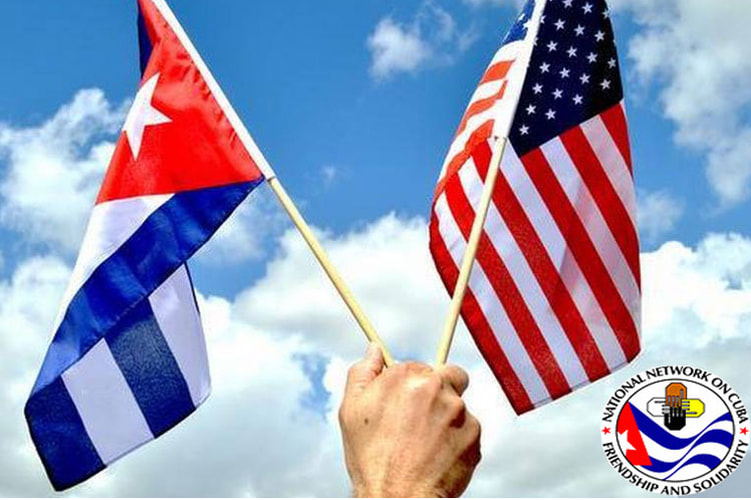
We are committed to working to end US aggressive policies toward Cuba, as well as, other Caribbean and Latin countries including U.S. regime change efforts in Venezuela and Bolivia. We support the struggles of popular movements of poor, working, and indigenous peoples of the Americas to obtain peace (economic, political & social), as well as, an end to environmental destruction.

